Mythology: Understanding Roman Culture through Literature
VerifiedAdded on 2022/10/10
|20
|6713
|321
AI Summary
Explore the rich culture of ancient Rome through literature with Desklib's study material. Learn about Roman societal norms, religion, and love poetry through Horace, Ovid, and more.
Contribute Materials
Your contribution can guide someone’s learning journey. Share your
documents today.
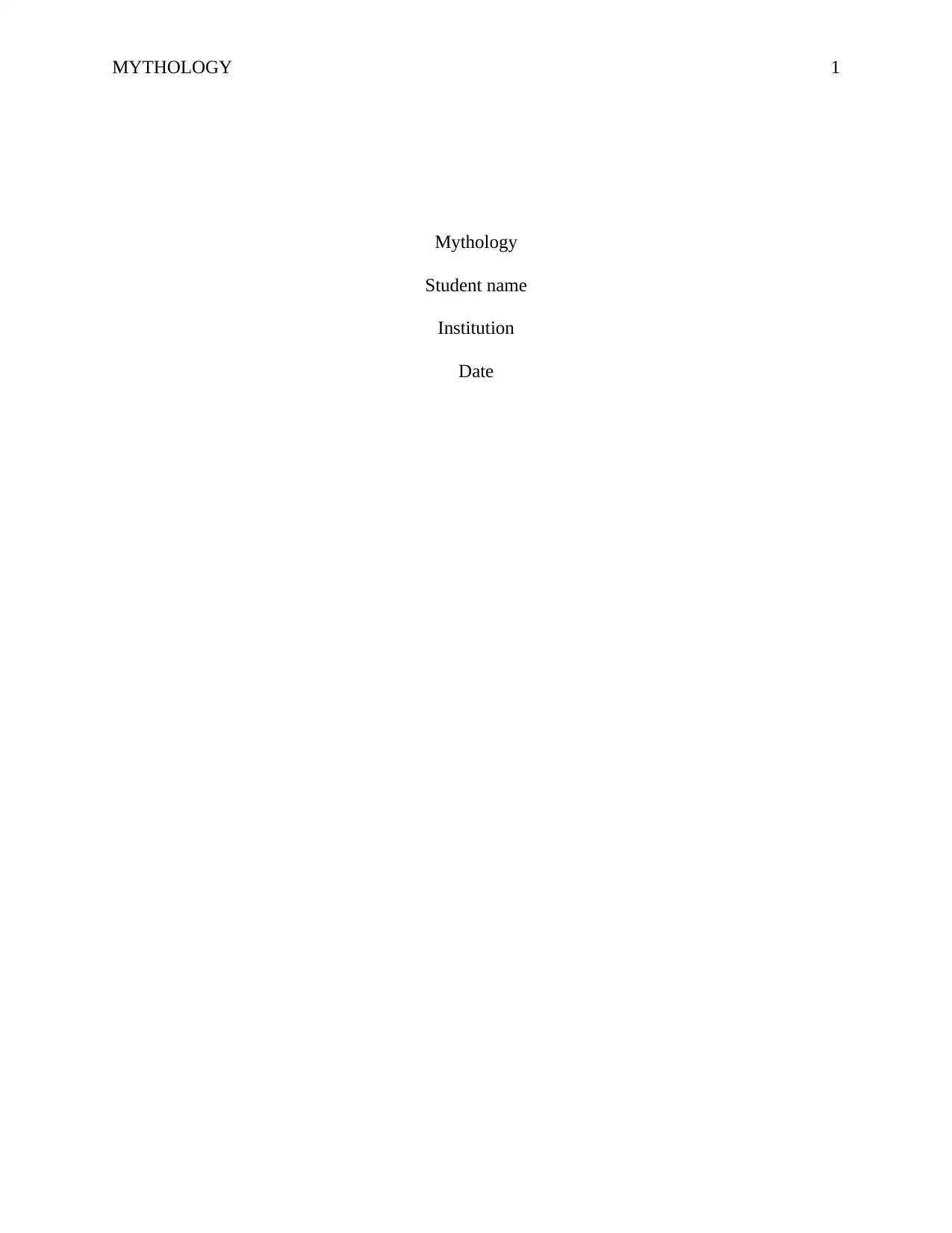
MYTHOLOGY 1
Mythology
Student name
Institution
Date
Mythology
Student name
Institution
Date
Secure Best Marks with AI Grader
Need help grading? Try our AI Grader for instant feedback on your assignments.
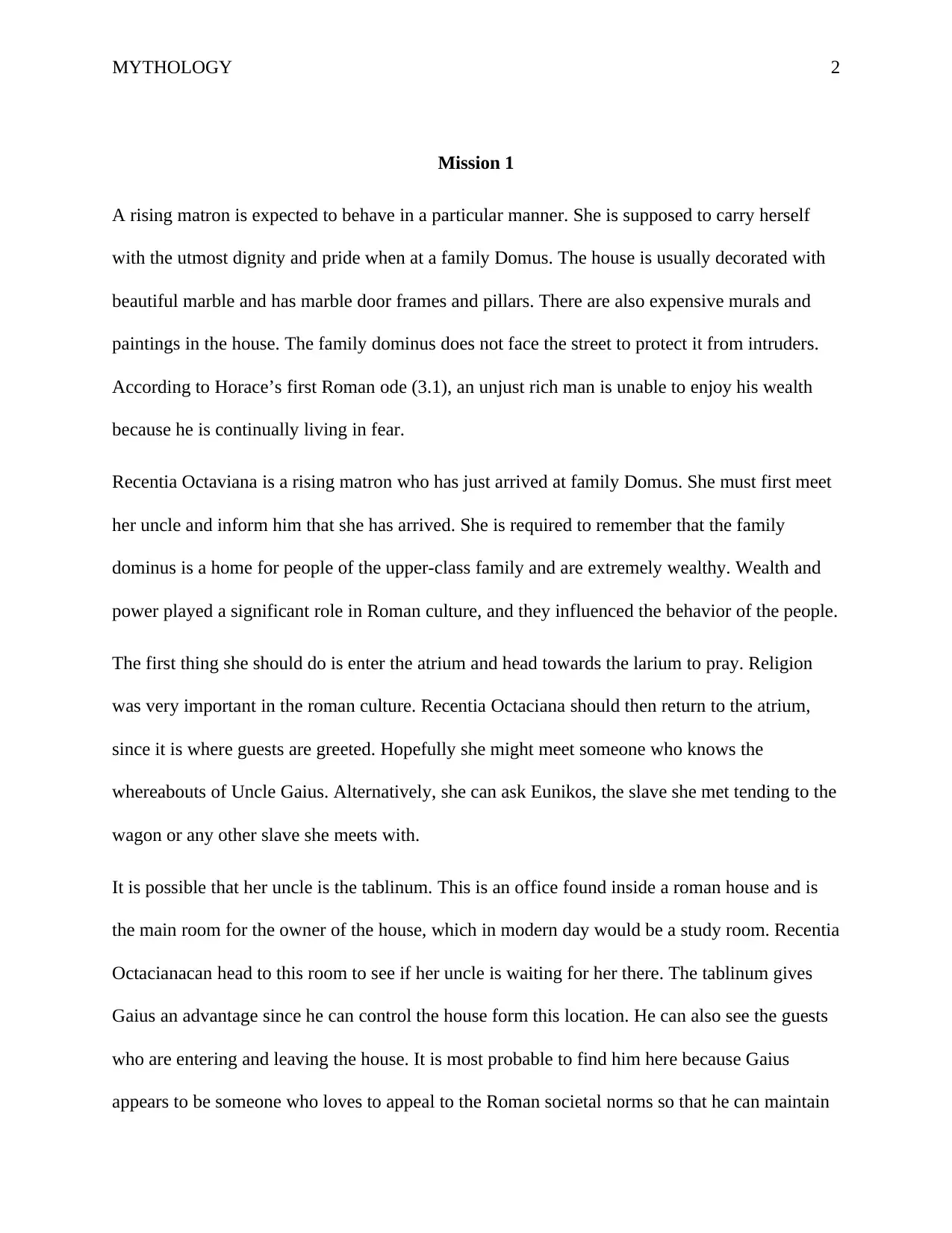
MYTHOLOGY 2
Mission 1
A rising matron is expected to behave in a particular manner. She is supposed to carry herself
with the utmost dignity and pride when at a family Domus. The house is usually decorated with
beautiful marble and has marble door frames and pillars. There are also expensive murals and
paintings in the house. The family dominus does not face the street to protect it from intruders.
According to Horace’s first Roman ode (3.1), an unjust rich man is unable to enjoy his wealth
because he is continually living in fear.
Recentia Octaviana is a rising matron who has just arrived at family Domus. She must first meet
her uncle and inform him that she has arrived. She is required to remember that the family
dominus is a home for people of the upper-class family and are extremely wealthy. Wealth and
power played a significant role in Roman culture, and they influenced the behavior of the people.
The first thing she should do is enter the atrium and head towards the larium to pray. Religion
was very important in the roman culture. Recentia Octaciana should then return to the atrium,
since it is where guests are greeted. Hopefully she might meet someone who knows the
whereabouts of Uncle Gaius. Alternatively, she can ask Eunikos, the slave she met tending to the
wagon or any other slave she meets with.
It is possible that her uncle is the tablinum. This is an office found inside a roman house and is
the main room for the owner of the house, which in modern day would be a study room. Recentia
Octacianacan head to this room to see if her uncle is waiting for her there. The tablinum gives
Gaius an advantage since he can control the house form this location. He can also see the guests
who are entering and leaving the house. It is most probable to find him here because Gaius
appears to be someone who loves to appeal to the Roman societal norms so that he can maintain
Mission 1
A rising matron is expected to behave in a particular manner. She is supposed to carry herself
with the utmost dignity and pride when at a family Domus. The house is usually decorated with
beautiful marble and has marble door frames and pillars. There are also expensive murals and
paintings in the house. The family dominus does not face the street to protect it from intruders.
According to Horace’s first Roman ode (3.1), an unjust rich man is unable to enjoy his wealth
because he is continually living in fear.
Recentia Octaviana is a rising matron who has just arrived at family Domus. She must first meet
her uncle and inform him that she has arrived. She is required to remember that the family
dominus is a home for people of the upper-class family and are extremely wealthy. Wealth and
power played a significant role in Roman culture, and they influenced the behavior of the people.
The first thing she should do is enter the atrium and head towards the larium to pray. Religion
was very important in the roman culture. Recentia Octaciana should then return to the atrium,
since it is where guests are greeted. Hopefully she might meet someone who knows the
whereabouts of Uncle Gaius. Alternatively, she can ask Eunikos, the slave she met tending to the
wagon or any other slave she meets with.
It is possible that her uncle is the tablinum. This is an office found inside a roman house and is
the main room for the owner of the house, which in modern day would be a study room. Recentia
Octacianacan head to this room to see if her uncle is waiting for her there. The tablinum gives
Gaius an advantage since he can control the house form this location. He can also see the guests
who are entering and leaving the house. It is most probable to find him here because Gaius
appears to be someone who loves to appeal to the Roman societal norms so that he can maintain
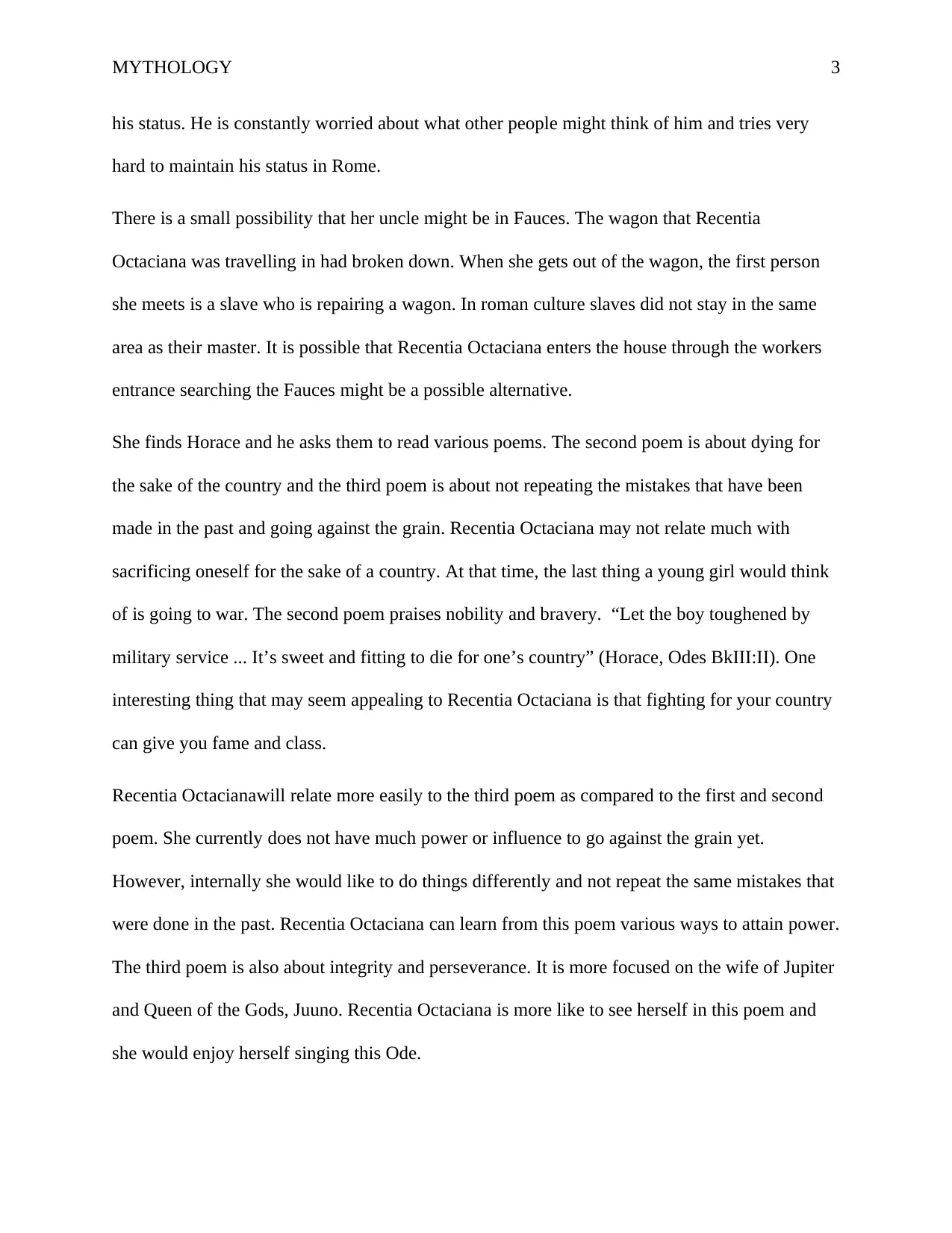
MYTHOLOGY 3
his status. He is constantly worried about what other people might think of him and tries very
hard to maintain his status in Rome.
There is a small possibility that her uncle might be in Fauces. The wagon that Recentia
Octaciana was travelling in had broken down. When she gets out of the wagon, the first person
she meets is a slave who is repairing a wagon. In roman culture slaves did not stay in the same
area as their master. It is possible that Recentia Octaciana enters the house through the workers
entrance searching the Fauces might be a possible alternative.
She finds Horace and he asks them to read various poems. The second poem is about dying for
the sake of the country and the third poem is about not repeating the mistakes that have been
made in the past and going against the grain. Recentia Octaciana may not relate much with
sacrificing oneself for the sake of a country. At that time, the last thing a young girl would think
of is going to war. The second poem praises nobility and bravery. “Let the boy toughened by
military service ... It’s sweet and fitting to die for one’s country” (Horace, Odes BkIII:II). One
interesting thing that may seem appealing to Recentia Octaciana is that fighting for your country
can give you fame and class.
Recentia Octacianawill relate more easily to the third poem as compared to the first and second
poem. She currently does not have much power or influence to go against the grain yet.
However, internally she would like to do things differently and not repeat the same mistakes that
were done in the past. Recentia Octaciana can learn from this poem various ways to attain power.
The third poem is also about integrity and perseverance. It is more focused on the wife of Jupiter
and Queen of the Gods, Juuno. Recentia Octaciana is more like to see herself in this poem and
she would enjoy herself singing this Ode.
his status. He is constantly worried about what other people might think of him and tries very
hard to maintain his status in Rome.
There is a small possibility that her uncle might be in Fauces. The wagon that Recentia
Octaciana was travelling in had broken down. When she gets out of the wagon, the first person
she meets is a slave who is repairing a wagon. In roman culture slaves did not stay in the same
area as their master. It is possible that Recentia Octaciana enters the house through the workers
entrance searching the Fauces might be a possible alternative.
She finds Horace and he asks them to read various poems. The second poem is about dying for
the sake of the country and the third poem is about not repeating the mistakes that have been
made in the past and going against the grain. Recentia Octaciana may not relate much with
sacrificing oneself for the sake of a country. At that time, the last thing a young girl would think
of is going to war. The second poem praises nobility and bravery. “Let the boy toughened by
military service ... It’s sweet and fitting to die for one’s country” (Horace, Odes BkIII:II). One
interesting thing that may seem appealing to Recentia Octaciana is that fighting for your country
can give you fame and class.
Recentia Octacianawill relate more easily to the third poem as compared to the first and second
poem. She currently does not have much power or influence to go against the grain yet.
However, internally she would like to do things differently and not repeat the same mistakes that
were done in the past. Recentia Octaciana can learn from this poem various ways to attain power.
The third poem is also about integrity and perseverance. It is more focused on the wife of Jupiter
and Queen of the Gods, Juuno. Recentia Octaciana is more like to see herself in this poem and
she would enjoy herself singing this Ode.
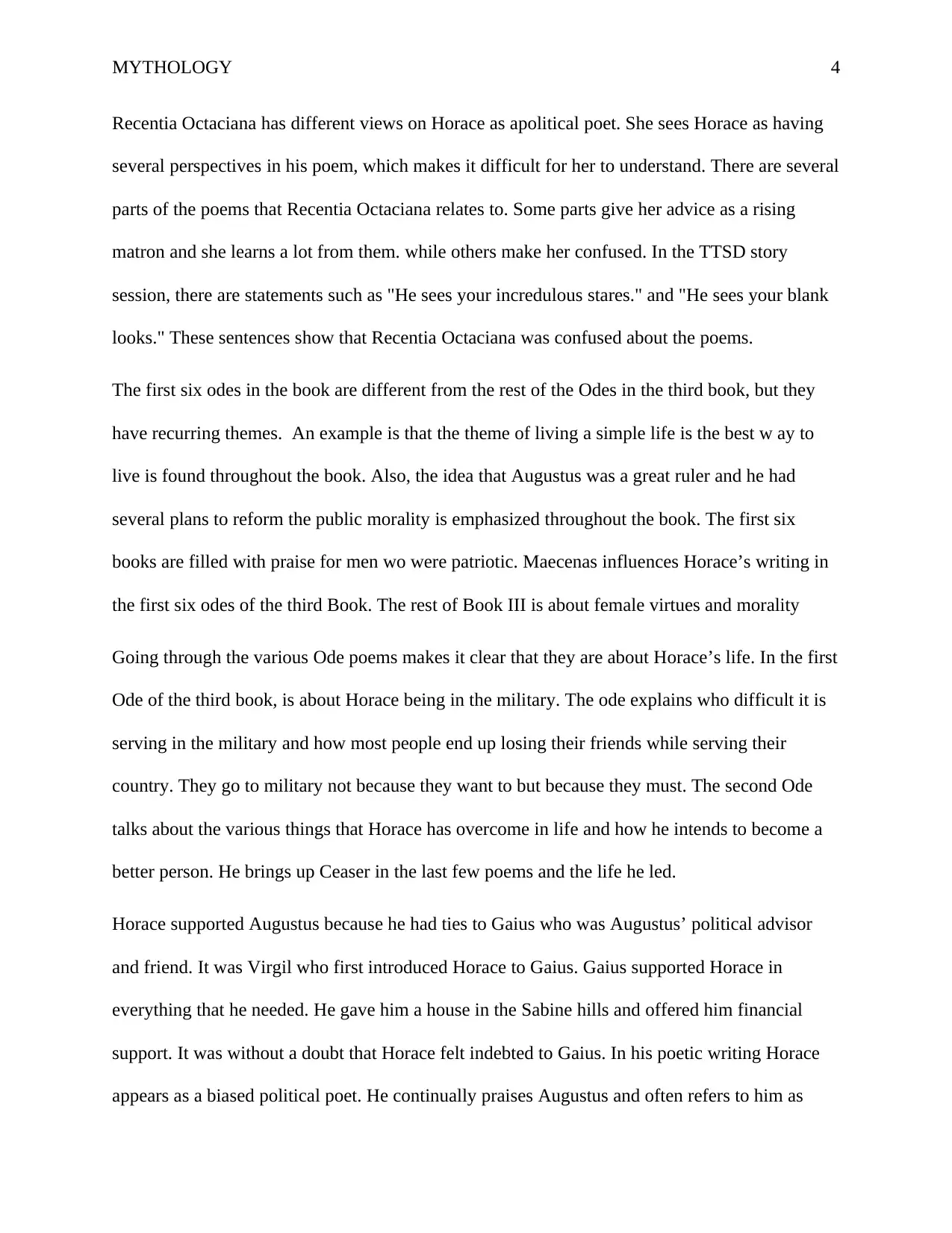
MYTHOLOGY 4
Recentia Octaciana has different views on Horace as apolitical poet. She sees Horace as having
several perspectives in his poem, which makes it difficult for her to understand. There are several
parts of the poems that Recentia Octaciana relates to. Some parts give her advice as a rising
matron and she learns a lot from them. while others make her confused. In the TTSD story
session, there are statements such as "He sees your incredulous stares." and "He sees your blank
looks." These sentences show that Recentia Octaciana was confused about the poems.
The first six odes in the book are different from the rest of the Odes in the third book, but they
have recurring themes. An example is that the theme of living a simple life is the best w ay to
live is found throughout the book. Also, the idea that Augustus was a great ruler and he had
several plans to reform the public morality is emphasized throughout the book. The first six
books are filled with praise for men wo were patriotic. Maecenas influences Horace’s writing in
the first six odes of the third Book. The rest of Book III is about female virtues and morality
Going through the various Ode poems makes it clear that they are about Horace’s life. In the first
Ode of the third book, is about Horace being in the military. The ode explains who difficult it is
serving in the military and how most people end up losing their friends while serving their
country. They go to military not because they want to but because they must. The second Ode
talks about the various things that Horace has overcome in life and how he intends to become a
better person. He brings up Ceaser in the last few poems and the life he led.
Horace supported Augustus because he had ties to Gaius who was Augustus’ political advisor
and friend. It was Virgil who first introduced Horace to Gaius. Gaius supported Horace in
everything that he needed. He gave him a house in the Sabine hills and offered him financial
support. It was without a doubt that Horace felt indebted to Gaius. In his poetic writing Horace
appears as a biased political poet. He continually praises Augustus and often refers to him as
Recentia Octaciana has different views on Horace as apolitical poet. She sees Horace as having
several perspectives in his poem, which makes it difficult for her to understand. There are several
parts of the poems that Recentia Octaciana relates to. Some parts give her advice as a rising
matron and she learns a lot from them. while others make her confused. In the TTSD story
session, there are statements such as "He sees your incredulous stares." and "He sees your blank
looks." These sentences show that Recentia Octaciana was confused about the poems.
The first six odes in the book are different from the rest of the Odes in the third book, but they
have recurring themes. An example is that the theme of living a simple life is the best w ay to
live is found throughout the book. Also, the idea that Augustus was a great ruler and he had
several plans to reform the public morality is emphasized throughout the book. The first six
books are filled with praise for men wo were patriotic. Maecenas influences Horace’s writing in
the first six odes of the third Book. The rest of Book III is about female virtues and morality
Going through the various Ode poems makes it clear that they are about Horace’s life. In the first
Ode of the third book, is about Horace being in the military. The ode explains who difficult it is
serving in the military and how most people end up losing their friends while serving their
country. They go to military not because they want to but because they must. The second Ode
talks about the various things that Horace has overcome in life and how he intends to become a
better person. He brings up Ceaser in the last few poems and the life he led.
Horace supported Augustus because he had ties to Gaius who was Augustus’ political advisor
and friend. It was Virgil who first introduced Horace to Gaius. Gaius supported Horace in
everything that he needed. He gave him a house in the Sabine hills and offered him financial
support. It was without a doubt that Horace felt indebted to Gaius. In his poetic writing Horace
appears as a biased political poet. He continually praises Augustus and often refers to him as
Paraphrase This Document
Need a fresh take? Get an instant paraphrase of this document with our AI Paraphraser
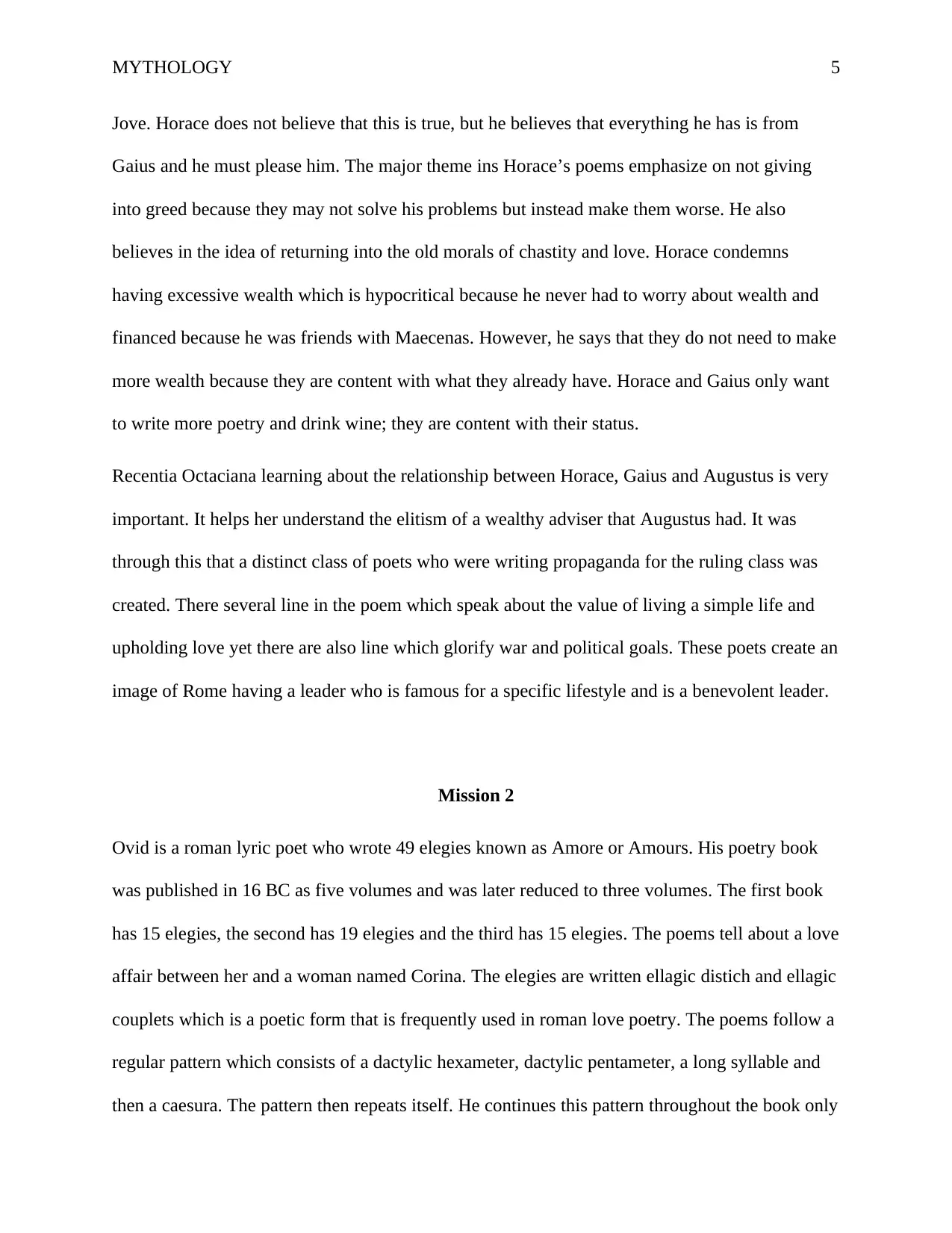
MYTHOLOGY 5
Jove. Horace does not believe that this is true, but he believes that everything he has is from
Gaius and he must please him. The major theme ins Horace’s poems emphasize on not giving
into greed because they may not solve his problems but instead make them worse. He also
believes in the idea of returning into the old morals of chastity and love. Horace condemns
having excessive wealth which is hypocritical because he never had to worry about wealth and
financed because he was friends with Maecenas. However, he says that they do not need to make
more wealth because they are content with what they already have. Horace and Gaius only want
to write more poetry and drink wine; they are content with their status.
Recentia Octaciana learning about the relationship between Horace, Gaius and Augustus is very
important. It helps her understand the elitism of a wealthy adviser that Augustus had. It was
through this that a distinct class of poets who were writing propaganda for the ruling class was
created. There several line in the poem which speak about the value of living a simple life and
upholding love yet there are also line which glorify war and political goals. These poets create an
image of Rome having a leader who is famous for a specific lifestyle and is a benevolent leader.
Mission 2
Ovid is a roman lyric poet who wrote 49 elegies known as Amore or Amours. His poetry book
was published in 16 BC as five volumes and was later reduced to three volumes. The first book
has 15 elegies, the second has 19 elegies and the third has 15 elegies. The poems tell about a love
affair between her and a woman named Corina. The elegies are written ellagic distich and ellagic
couplets which is a poetic form that is frequently used in roman love poetry. The poems follow a
regular pattern which consists of a dactylic hexameter, dactylic pentameter, a long syllable and
then a caesura. The pattern then repeats itself. He continues this pattern throughout the book only
Jove. Horace does not believe that this is true, but he believes that everything he has is from
Gaius and he must please him. The major theme ins Horace’s poems emphasize on not giving
into greed because they may not solve his problems but instead make them worse. He also
believes in the idea of returning into the old morals of chastity and love. Horace condemns
having excessive wealth which is hypocritical because he never had to worry about wealth and
financed because he was friends with Maecenas. However, he says that they do not need to make
more wealth because they are content with what they already have. Horace and Gaius only want
to write more poetry and drink wine; they are content with their status.
Recentia Octaciana learning about the relationship between Horace, Gaius and Augustus is very
important. It helps her understand the elitism of a wealthy adviser that Augustus had. It was
through this that a distinct class of poets who were writing propaganda for the ruling class was
created. There several line in the poem which speak about the value of living a simple life and
upholding love yet there are also line which glorify war and political goals. These poets create an
image of Rome having a leader who is famous for a specific lifestyle and is a benevolent leader.
Mission 2
Ovid is a roman lyric poet who wrote 49 elegies known as Amore or Amours. His poetry book
was published in 16 BC as five volumes and was later reduced to three volumes. The first book
has 15 elegies, the second has 19 elegies and the third has 15 elegies. The poems tell about a love
affair between her and a woman named Corina. The elegies are written ellagic distich and ellagic
couplets which is a poetic form that is frequently used in roman love poetry. The poems follow a
regular pattern which consists of a dactylic hexameter, dactylic pentameter, a long syllable and
then a caesura. The pattern then repeats itself. He continues this pattern throughout the book only
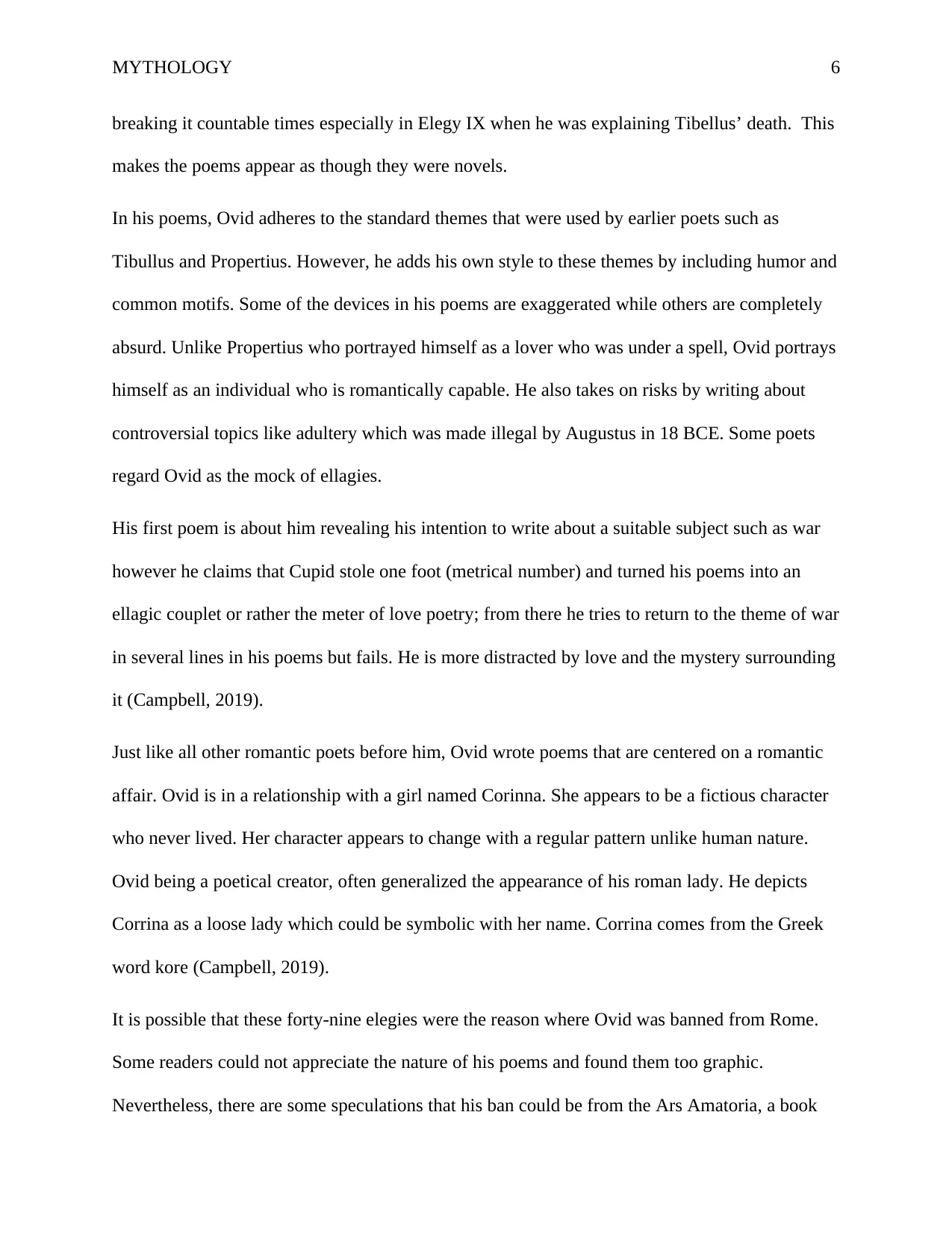
MYTHOLOGY 6
breaking it countable times especially in Elegy IX when he was explaining Tibellus’ death. This
makes the poems appear as though they were novels.
In his poems, Ovid adheres to the standard themes that were used by earlier poets such as
Tibullus and Propertius. However, he adds his own style to these themes by including humor and
common motifs. Some of the devices in his poems are exaggerated while others are completely
absurd. Unlike Propertius who portrayed himself as a lover who was under a spell, Ovid portrays
himself as an individual who is romantically capable. He also takes on risks by writing about
controversial topics like adultery which was made illegal by Augustus in 18 BCE. Some poets
regard Ovid as the mock of ellagies.
His first poem is about him revealing his intention to write about a suitable subject such as war
however he claims that Cupid stole one foot (metrical number) and turned his poems into an
ellagic couplet or rather the meter of love poetry; from there he tries to return to the theme of war
in several lines in his poems but fails. He is more distracted by love and the mystery surrounding
it (Campbell, 2019).
Just like all other romantic poets before him, Ovid wrote poems that are centered on a romantic
affair. Ovid is in a relationship with a girl named Corinna. She appears to be a fictious character
who never lived. Her character appears to change with a regular pattern unlike human nature.
Ovid being a poetical creator, often generalized the appearance of his roman lady. He depicts
Corrina as a loose lady which could be symbolic with her name. Corrina comes from the Greek
word kore (Campbell, 2019).
It is possible that these forty-nine elegies were the reason where Ovid was banned from Rome.
Some readers could not appreciate the nature of his poems and found them too graphic.
Nevertheless, there are some speculations that his ban could be from the Ars Amatoria, a book
breaking it countable times especially in Elegy IX when he was explaining Tibellus’ death. This
makes the poems appear as though they were novels.
In his poems, Ovid adheres to the standard themes that were used by earlier poets such as
Tibullus and Propertius. However, he adds his own style to these themes by including humor and
common motifs. Some of the devices in his poems are exaggerated while others are completely
absurd. Unlike Propertius who portrayed himself as a lover who was under a spell, Ovid portrays
himself as an individual who is romantically capable. He also takes on risks by writing about
controversial topics like adultery which was made illegal by Augustus in 18 BCE. Some poets
regard Ovid as the mock of ellagies.
His first poem is about him revealing his intention to write about a suitable subject such as war
however he claims that Cupid stole one foot (metrical number) and turned his poems into an
ellagic couplet or rather the meter of love poetry; from there he tries to return to the theme of war
in several lines in his poems but fails. He is more distracted by love and the mystery surrounding
it (Campbell, 2019).
Just like all other romantic poets before him, Ovid wrote poems that are centered on a romantic
affair. Ovid is in a relationship with a girl named Corinna. She appears to be a fictious character
who never lived. Her character appears to change with a regular pattern unlike human nature.
Ovid being a poetical creator, often generalized the appearance of his roman lady. He depicts
Corrina as a loose lady which could be symbolic with her name. Corrina comes from the Greek
word kore (Campbell, 2019).
It is possible that these forty-nine elegies were the reason where Ovid was banned from Rome.
Some readers could not appreciate the nature of his poems and found them too graphic.
Nevertheless, there are some speculations that his ban could be from the Ars Amatoria, a book
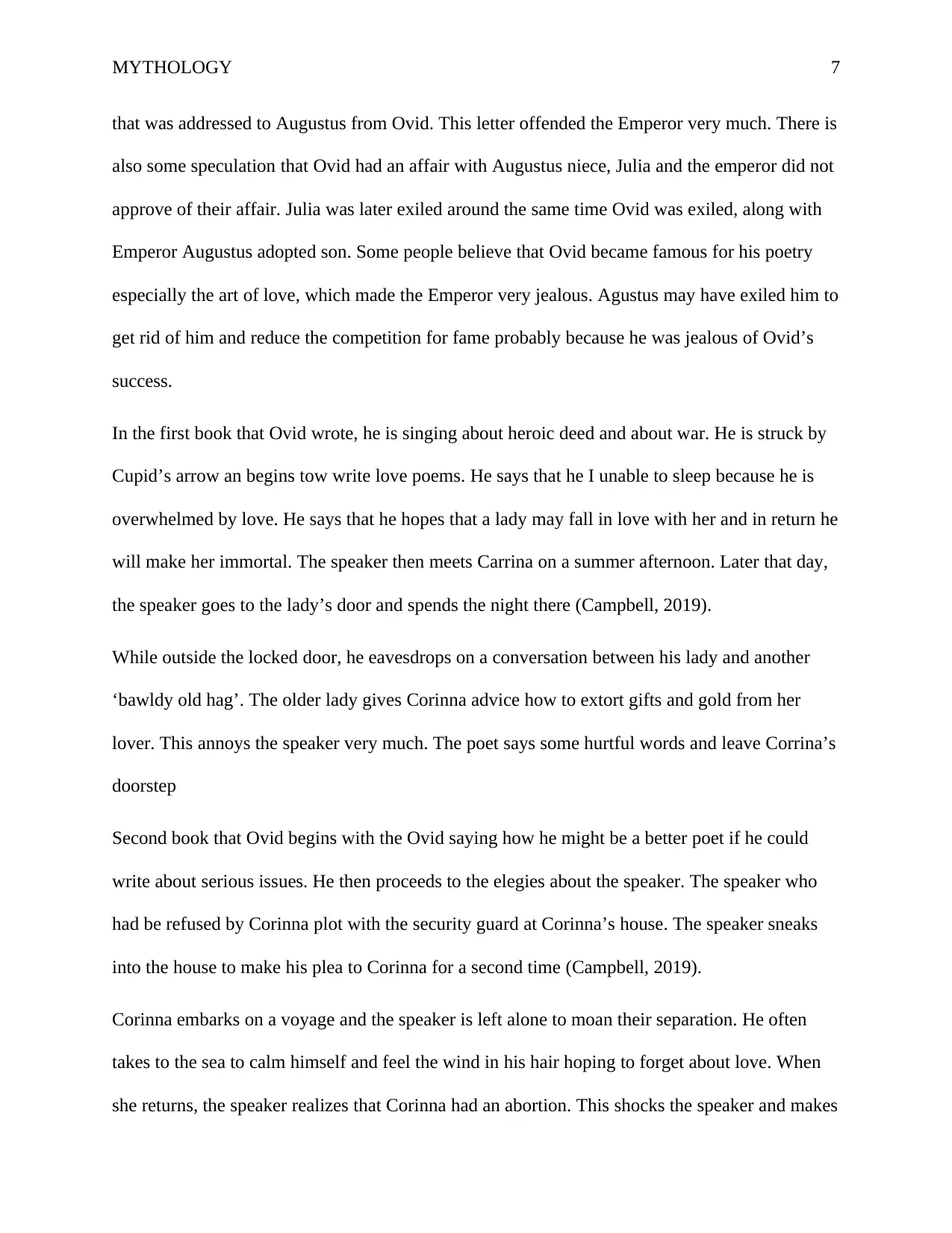
MYTHOLOGY 7
that was addressed to Augustus from Ovid. This letter offended the Emperor very much. There is
also some speculation that Ovid had an affair with Augustus niece, Julia and the emperor did not
approve of their affair. Julia was later exiled around the same time Ovid was exiled, along with
Emperor Augustus adopted son. Some people believe that Ovid became famous for his poetry
especially the art of love, which made the Emperor very jealous. Agustus may have exiled him to
get rid of him and reduce the competition for fame probably because he was jealous of Ovid’s
success.
In the first book that Ovid wrote, he is singing about heroic deed and about war. He is struck by
Cupid’s arrow an begins tow write love poems. He says that he I unable to sleep because he is
overwhelmed by love. He says that he hopes that a lady may fall in love with her and in return he
will make her immortal. The speaker then meets Carrina on a summer afternoon. Later that day,
the speaker goes to the lady’s door and spends the night there (Campbell, 2019).
While outside the locked door, he eavesdrops on a conversation between his lady and another
‘bawldy old hag’. The older lady gives Corinna advice how to extort gifts and gold from her
lover. This annoys the speaker very much. The poet says some hurtful words and leave Corrina’s
doorstep
Second book that Ovid begins with the Ovid saying how he might be a better poet if he could
write about serious issues. He then proceeds to the elegies about the speaker. The speaker who
had be refused by Corinna plot with the security guard at Corinna’s house. The speaker sneaks
into the house to make his plea to Corinna for a second time (Campbell, 2019).
Corinna embarks on a voyage and the speaker is left alone to moan their separation. He often
takes to the sea to calm himself and feel the wind in his hair hoping to forget about love. When
she returns, the speaker realizes that Corinna had an abortion. This shocks the speaker and makes
that was addressed to Augustus from Ovid. This letter offended the Emperor very much. There is
also some speculation that Ovid had an affair with Augustus niece, Julia and the emperor did not
approve of their affair. Julia was later exiled around the same time Ovid was exiled, along with
Emperor Augustus adopted son. Some people believe that Ovid became famous for his poetry
especially the art of love, which made the Emperor very jealous. Agustus may have exiled him to
get rid of him and reduce the competition for fame probably because he was jealous of Ovid’s
success.
In the first book that Ovid wrote, he is singing about heroic deed and about war. He is struck by
Cupid’s arrow an begins tow write love poems. He says that he I unable to sleep because he is
overwhelmed by love. He says that he hopes that a lady may fall in love with her and in return he
will make her immortal. The speaker then meets Carrina on a summer afternoon. Later that day,
the speaker goes to the lady’s door and spends the night there (Campbell, 2019).
While outside the locked door, he eavesdrops on a conversation between his lady and another
‘bawldy old hag’. The older lady gives Corinna advice how to extort gifts and gold from her
lover. This annoys the speaker very much. The poet says some hurtful words and leave Corrina’s
doorstep
Second book that Ovid begins with the Ovid saying how he might be a better poet if he could
write about serious issues. He then proceeds to the elegies about the speaker. The speaker who
had be refused by Corinna plot with the security guard at Corinna’s house. The speaker sneaks
into the house to make his plea to Corinna for a second time (Campbell, 2019).
Corinna embarks on a voyage and the speaker is left alone to moan their separation. He often
takes to the sea to calm himself and feel the wind in his hair hoping to forget about love. When
she returns, the speaker realizes that Corinna had an abortion. This shocks the speaker and makes
Secure Best Marks with AI Grader
Need help grading? Try our AI Grader for instant feedback on your assignments.
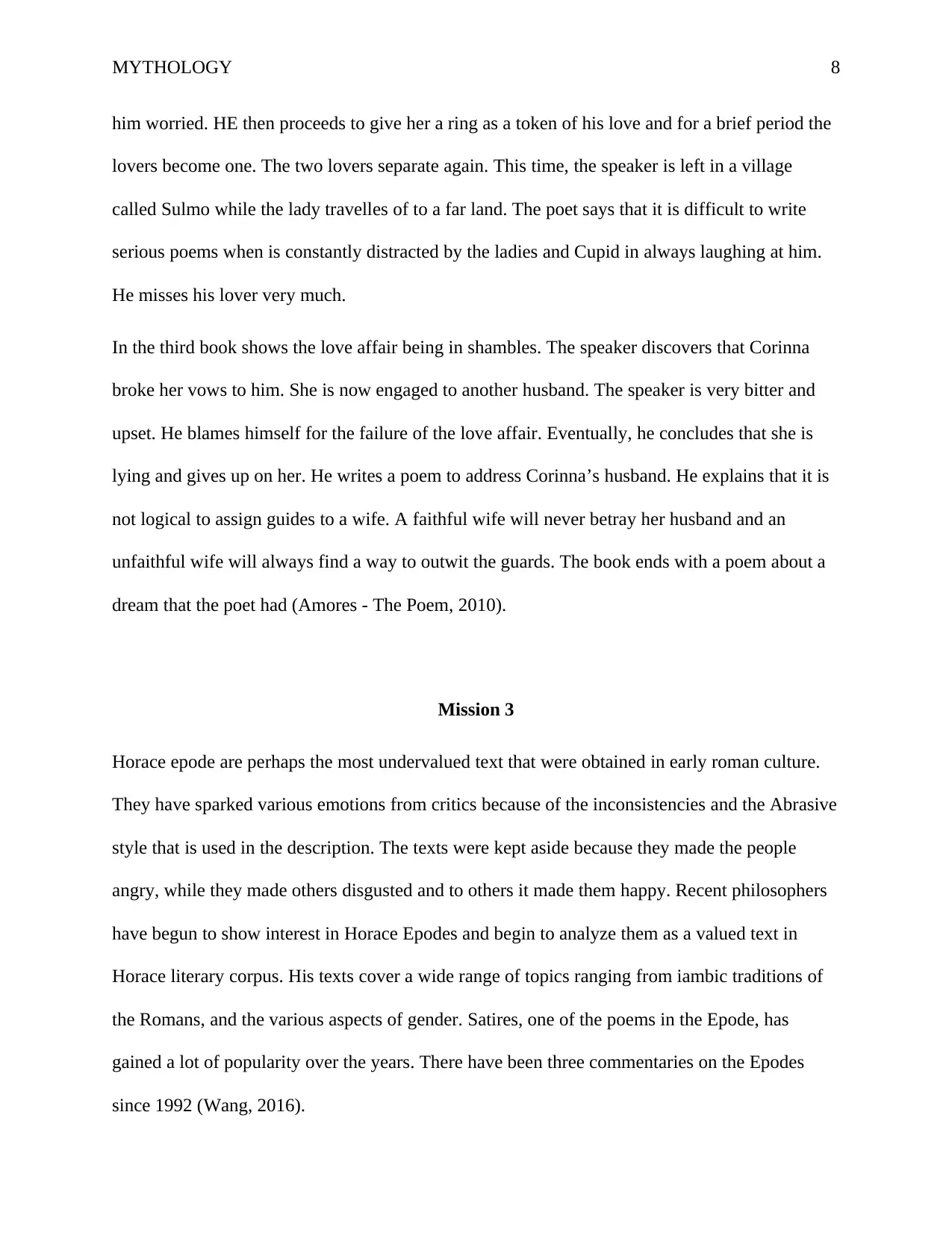
MYTHOLOGY 8
him worried. HE then proceeds to give her a ring as a token of his love and for a brief period the
lovers become one. The two lovers separate again. This time, the speaker is left in a village
called Sulmo while the lady travelles of to a far land. The poet says that it is difficult to write
serious poems when is constantly distracted by the ladies and Cupid in always laughing at him.
He misses his lover very much.
In the third book shows the love affair being in shambles. The speaker discovers that Corinna
broke her vows to him. She is now engaged to another husband. The speaker is very bitter and
upset. He blames himself for the failure of the love affair. Eventually, he concludes that she is
lying and gives up on her. He writes a poem to address Corinna’s husband. He explains that it is
not logical to assign guides to a wife. A faithful wife will never betray her husband and an
unfaithful wife will always find a way to outwit the guards. The book ends with a poem about a
dream that the poet had (Amores - The Poem, 2010).
Mission 3
Horace epode are perhaps the most undervalued text that were obtained in early roman culture.
They have sparked various emotions from critics because of the inconsistencies and the Abrasive
style that is used in the description. The texts were kept aside because they made the people
angry, while they made others disgusted and to others it made them happy. Recent philosophers
have begun to show interest in Horace Epodes and begin to analyze them as a valued text in
Horace literary corpus. His texts cover a wide range of topics ranging from iambic traditions of
the Romans, and the various aspects of gender. Satires, one of the poems in the Epode, has
gained a lot of popularity over the years. There have been three commentaries on the Epodes
since 1992 (Wang, 2016).
him worried. HE then proceeds to give her a ring as a token of his love and for a brief period the
lovers become one. The two lovers separate again. This time, the speaker is left in a village
called Sulmo while the lady travelles of to a far land. The poet says that it is difficult to write
serious poems when is constantly distracted by the ladies and Cupid in always laughing at him.
He misses his lover very much.
In the third book shows the love affair being in shambles. The speaker discovers that Corinna
broke her vows to him. She is now engaged to another husband. The speaker is very bitter and
upset. He blames himself for the failure of the love affair. Eventually, he concludes that she is
lying and gives up on her. He writes a poem to address Corinna’s husband. He explains that it is
not logical to assign guides to a wife. A faithful wife will never betray her husband and an
unfaithful wife will always find a way to outwit the guards. The book ends with a poem about a
dream that the poet had (Amores - The Poem, 2010).
Mission 3
Horace epode are perhaps the most undervalued text that were obtained in early roman culture.
They have sparked various emotions from critics because of the inconsistencies and the Abrasive
style that is used in the description. The texts were kept aside because they made the people
angry, while they made others disgusted and to others it made them happy. Recent philosophers
have begun to show interest in Horace Epodes and begin to analyze them as a valued text in
Horace literary corpus. His texts cover a wide range of topics ranging from iambic traditions of
the Romans, and the various aspects of gender. Satires, one of the poems in the Epode, has
gained a lot of popularity over the years. There have been three commentaries on the Epodes
since 1992 (Wang, 2016).
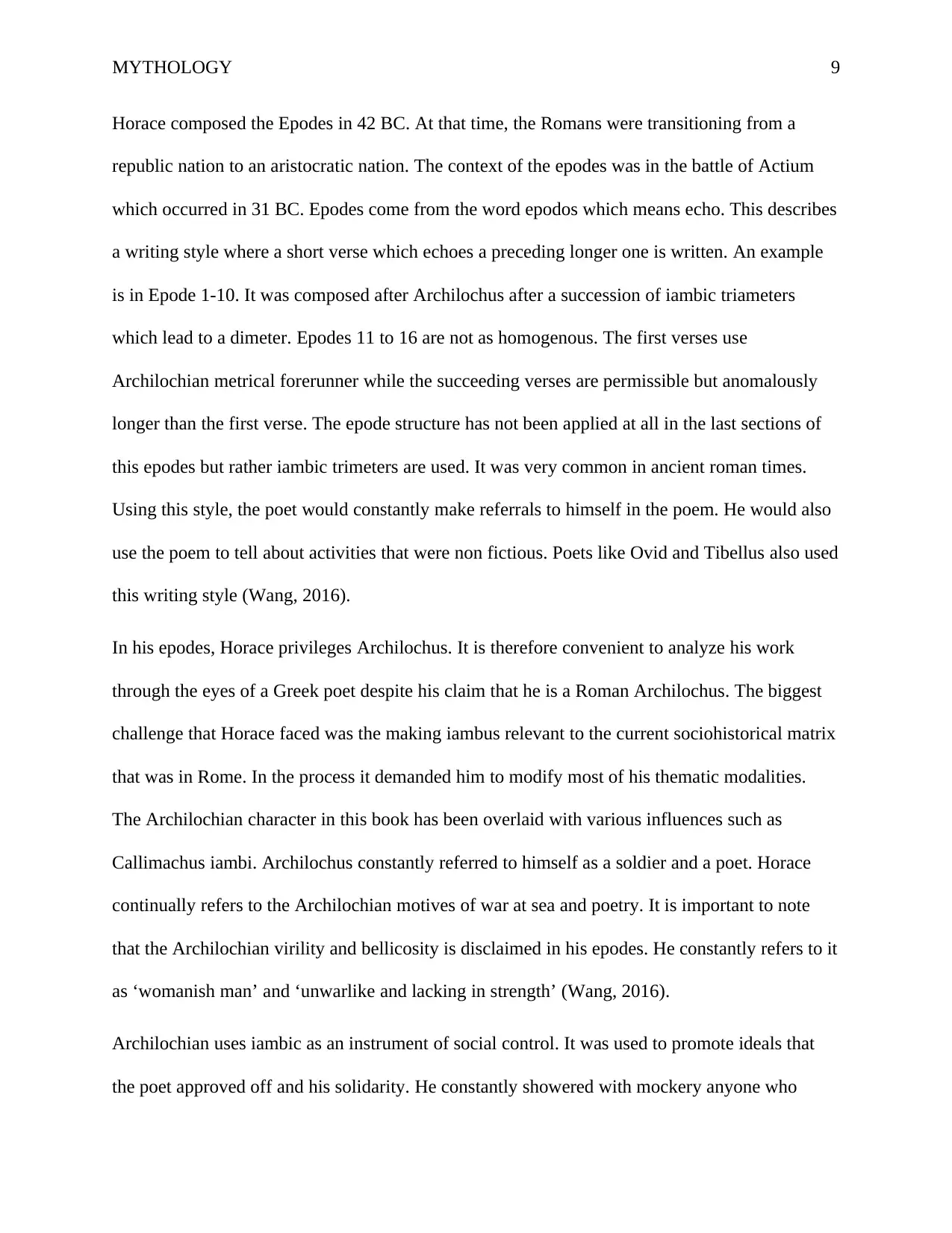
MYTHOLOGY 9
Horace composed the Epodes in 42 BC. At that time, the Romans were transitioning from a
republic nation to an aristocratic nation. The context of the epodes was in the battle of Actium
which occurred in 31 BC. Epodes come from the word epodos which means echo. This describes
a writing style where a short verse which echoes a preceding longer one is written. An example
is in Epode 1-10. It was composed after Archilochus after a succession of iambic triameters
which lead to a dimeter. Epodes 11 to 16 are not as homogenous. The first verses use
Archilochian metrical forerunner while the succeeding verses are permissible but anomalously
longer than the first verse. The epode structure has not been applied at all in the last sections of
this epodes but rather iambic trimeters are used. It was very common in ancient roman times.
Using this style, the poet would constantly make referrals to himself in the poem. He would also
use the poem to tell about activities that were non fictious. Poets like Ovid and Tibellus also used
this writing style (Wang, 2016).
In his epodes, Horace privileges Archilochus. It is therefore convenient to analyze his work
through the eyes of a Greek poet despite his claim that he is a Roman Archilochus. The biggest
challenge that Horace faced was the making iambus relevant to the current sociohistorical matrix
that was in Rome. In the process it demanded him to modify most of his thematic modalities.
The Archilochian character in this book has been overlaid with various influences such as
Callimachus iambi. Archilochus constantly referred to himself as a soldier and a poet. Horace
continually refers to the Archilochian motives of war at sea and poetry. It is important to note
that the Archilochian virility and bellicosity is disclaimed in his epodes. He constantly refers to it
as ‘womanish man’ and ‘unwarlike and lacking in strength’ (Wang, 2016).
Archilochian uses iambic as an instrument of social control. It was used to promote ideals that
the poet approved off and his solidarity. He constantly showered with mockery anyone who
Horace composed the Epodes in 42 BC. At that time, the Romans were transitioning from a
republic nation to an aristocratic nation. The context of the epodes was in the battle of Actium
which occurred in 31 BC. Epodes come from the word epodos which means echo. This describes
a writing style where a short verse which echoes a preceding longer one is written. An example
is in Epode 1-10. It was composed after Archilochus after a succession of iambic triameters
which lead to a dimeter. Epodes 11 to 16 are not as homogenous. The first verses use
Archilochian metrical forerunner while the succeeding verses are permissible but anomalously
longer than the first verse. The epode structure has not been applied at all in the last sections of
this epodes but rather iambic trimeters are used. It was very common in ancient roman times.
Using this style, the poet would constantly make referrals to himself in the poem. He would also
use the poem to tell about activities that were non fictious. Poets like Ovid and Tibellus also used
this writing style (Wang, 2016).
In his epodes, Horace privileges Archilochus. It is therefore convenient to analyze his work
through the eyes of a Greek poet despite his claim that he is a Roman Archilochus. The biggest
challenge that Horace faced was the making iambus relevant to the current sociohistorical matrix
that was in Rome. In the process it demanded him to modify most of his thematic modalities.
The Archilochian character in this book has been overlaid with various influences such as
Callimachus iambi. Archilochus constantly referred to himself as a soldier and a poet. Horace
continually refers to the Archilochian motives of war at sea and poetry. It is important to note
that the Archilochian virility and bellicosity is disclaimed in his epodes. He constantly refers to it
as ‘womanish man’ and ‘unwarlike and lacking in strength’ (Wang, 2016).
Archilochian uses iambic as an instrument of social control. It was used to promote ideals that
the poet approved off and his solidarity. He constantly showered with mockery anyone who
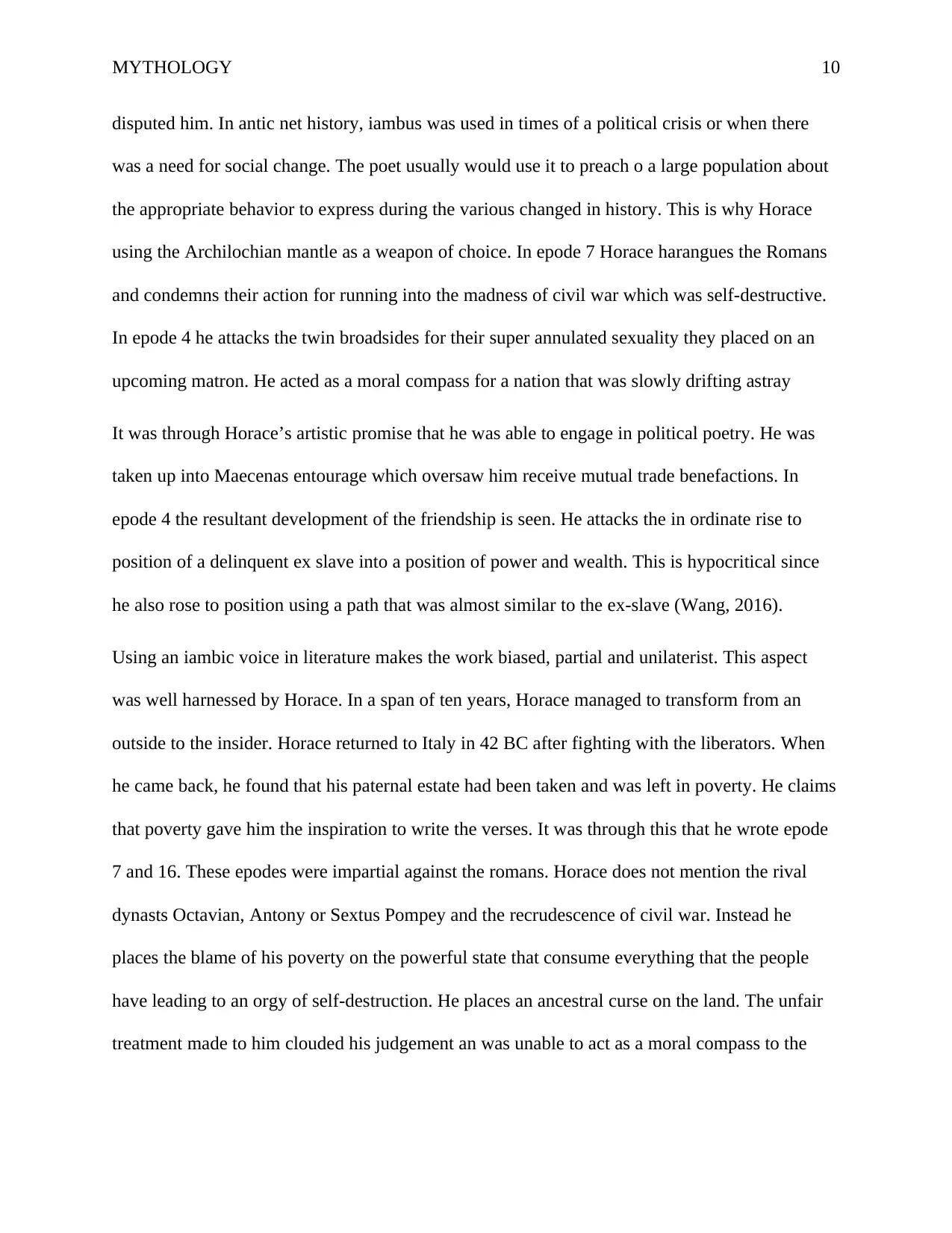
MYTHOLOGY 10
disputed him. In antic net history, iambus was used in times of a political crisis or when there
was a need for social change. The poet usually would use it to preach o a large population about
the appropriate behavior to express during the various changed in history. This is why Horace
using the Archilochian mantle as a weapon of choice. In epode 7 Horace harangues the Romans
and condemns their action for running into the madness of civil war which was self-destructive.
In epode 4 he attacks the twin broadsides for their super annulated sexuality they placed on an
upcoming matron. He acted as a moral compass for a nation that was slowly drifting astray
It was through Horace’s artistic promise that he was able to engage in political poetry. He was
taken up into Maecenas entourage which oversaw him receive mutual trade benefactions. In
epode 4 the resultant development of the friendship is seen. He attacks the in ordinate rise to
position of a delinquent ex slave into a position of power and wealth. This is hypocritical since
he also rose to position using a path that was almost similar to the ex-slave (Wang, 2016).
Using an iambic voice in literature makes the work biased, partial and unilaterist. This aspect
was well harnessed by Horace. In a span of ten years, Horace managed to transform from an
outside to the insider. Horace returned to Italy in 42 BC after fighting with the liberators. When
he came back, he found that his paternal estate had been taken and was left in poverty. He claims
that poverty gave him the inspiration to write the verses. It was through this that he wrote epode
7 and 16. These epodes were impartial against the romans. Horace does not mention the rival
dynasts Octavian, Antony or Sextus Pompey and the recrudescence of civil war. Instead he
places the blame of his poverty on the powerful state that consume everything that the people
have leading to an orgy of self-destruction. He places an ancestral curse on the land. The unfair
treatment made to him clouded his judgement an was unable to act as a moral compass to the
disputed him. In antic net history, iambus was used in times of a political crisis or when there
was a need for social change. The poet usually would use it to preach o a large population about
the appropriate behavior to express during the various changed in history. This is why Horace
using the Archilochian mantle as a weapon of choice. In epode 7 Horace harangues the Romans
and condemns their action for running into the madness of civil war which was self-destructive.
In epode 4 he attacks the twin broadsides for their super annulated sexuality they placed on an
upcoming matron. He acted as a moral compass for a nation that was slowly drifting astray
It was through Horace’s artistic promise that he was able to engage in political poetry. He was
taken up into Maecenas entourage which oversaw him receive mutual trade benefactions. In
epode 4 the resultant development of the friendship is seen. He attacks the in ordinate rise to
position of a delinquent ex slave into a position of power and wealth. This is hypocritical since
he also rose to position using a path that was almost similar to the ex-slave (Wang, 2016).
Using an iambic voice in literature makes the work biased, partial and unilaterist. This aspect
was well harnessed by Horace. In a span of ten years, Horace managed to transform from an
outside to the insider. Horace returned to Italy in 42 BC after fighting with the liberators. When
he came back, he found that his paternal estate had been taken and was left in poverty. He claims
that poverty gave him the inspiration to write the verses. It was through this that he wrote epode
7 and 16. These epodes were impartial against the romans. Horace does not mention the rival
dynasts Octavian, Antony or Sextus Pompey and the recrudescence of civil war. Instead he
places the blame of his poverty on the powerful state that consume everything that the people
have leading to an orgy of self-destruction. He places an ancestral curse on the land. The unfair
treatment made to him clouded his judgement an was unable to act as a moral compass to the
Paraphrase This Document
Need a fresh take? Get an instant paraphrase of this document with our AI Paraphraser
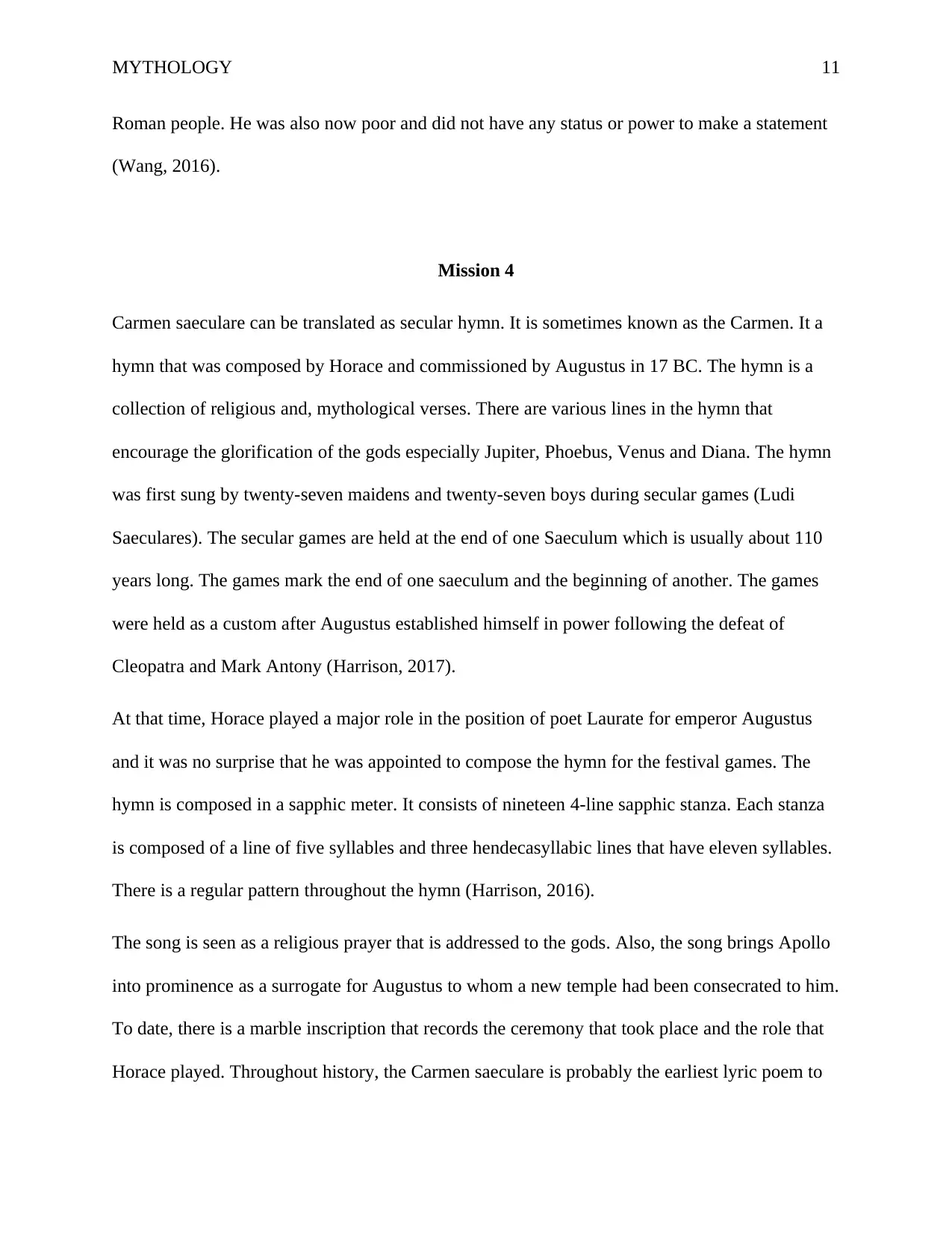
MYTHOLOGY 11
Roman people. He was also now poor and did not have any status or power to make a statement
(Wang, 2016).
Mission 4
Carmen saeculare can be translated as secular hymn. It is sometimes known as the Carmen. It a
hymn that was composed by Horace and commissioned by Augustus in 17 BC. The hymn is a
collection of religious and, mythological verses. There are various lines in the hymn that
encourage the glorification of the gods especially Jupiter, Phoebus, Venus and Diana. The hymn
was first sung by twenty-seven maidens and twenty-seven boys during secular games (Ludi
Saeculares). The secular games are held at the end of one Saeculum which is usually about 110
years long. The games mark the end of one saeculum and the beginning of another. The games
were held as a custom after Augustus established himself in power following the defeat of
Cleopatra and Mark Antony (Harrison, 2017).
At that time, Horace played a major role in the position of poet Laurate for emperor Augustus
and it was no surprise that he was appointed to compose the hymn for the festival games. The
hymn is composed in a sapphic meter. It consists of nineteen 4-line sapphic stanza. Each stanza
is composed of a line of five syllables and three hendecasyllabic lines that have eleven syllables.
There is a regular pattern throughout the hymn (Harrison, 2016).
The song is seen as a religious prayer that is addressed to the gods. Also, the song brings Apollo
into prominence as a surrogate for Augustus to whom a new temple had been consecrated to him.
To date, there is a marble inscription that records the ceremony that took place and the role that
Horace played. Throughout history, the Carmen saeculare is probably the earliest lyric poem to
Roman people. He was also now poor and did not have any status or power to make a statement
(Wang, 2016).
Mission 4
Carmen saeculare can be translated as secular hymn. It is sometimes known as the Carmen. It a
hymn that was composed by Horace and commissioned by Augustus in 17 BC. The hymn is a
collection of religious and, mythological verses. There are various lines in the hymn that
encourage the glorification of the gods especially Jupiter, Phoebus, Venus and Diana. The hymn
was first sung by twenty-seven maidens and twenty-seven boys during secular games (Ludi
Saeculares). The secular games are held at the end of one Saeculum which is usually about 110
years long. The games mark the end of one saeculum and the beginning of another. The games
were held as a custom after Augustus established himself in power following the defeat of
Cleopatra and Mark Antony (Harrison, 2017).
At that time, Horace played a major role in the position of poet Laurate for emperor Augustus
and it was no surprise that he was appointed to compose the hymn for the festival games. The
hymn is composed in a sapphic meter. It consists of nineteen 4-line sapphic stanza. Each stanza
is composed of a line of five syllables and three hendecasyllabic lines that have eleven syllables.
There is a regular pattern throughout the hymn (Harrison, 2016).
The song is seen as a religious prayer that is addressed to the gods. Also, the song brings Apollo
into prominence as a surrogate for Augustus to whom a new temple had been consecrated to him.
To date, there is a marble inscription that records the ceremony that took place and the role that
Horace played. Throughout history, the Carmen saeculare is probably the earliest lyric poem to
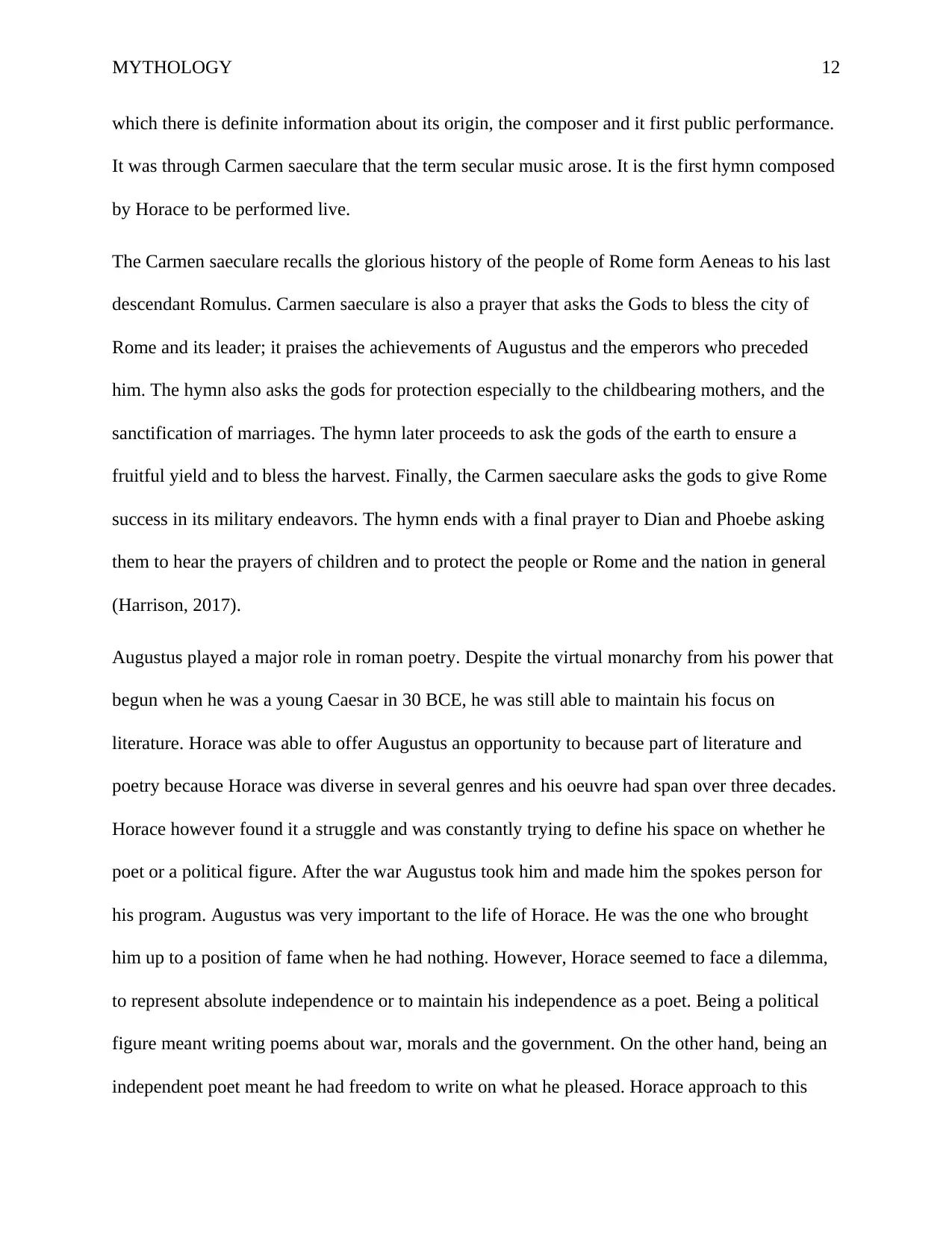
MYTHOLOGY 12
which there is definite information about its origin, the composer and it first public performance.
It was through Carmen saeculare that the term secular music arose. It is the first hymn composed
by Horace to be performed live.
The Carmen saeculare recalls the glorious history of the people of Rome form Aeneas to his last
descendant Romulus. Carmen saeculare is also a prayer that asks the Gods to bless the city of
Rome and its leader; it praises the achievements of Augustus and the emperors who preceded
him. The hymn also asks the gods for protection especially to the childbearing mothers, and the
sanctification of marriages. The hymn later proceeds to ask the gods of the earth to ensure a
fruitful yield and to bless the harvest. Finally, the Carmen saeculare asks the gods to give Rome
success in its military endeavors. The hymn ends with a final prayer to Dian and Phoebe asking
them to hear the prayers of children and to protect the people or Rome and the nation in general
(Harrison, 2017).
Augustus played a major role in roman poetry. Despite the virtual monarchy from his power that
begun when he was a young Caesar in 30 BCE, he was still able to maintain his focus on
literature. Horace was able to offer Augustus an opportunity to because part of literature and
poetry because Horace was diverse in several genres and his oeuvre had span over three decades.
Horace however found it a struggle and was constantly trying to define his space on whether he
poet or a political figure. After the war Augustus took him and made him the spokes person for
his program. Augustus was very important to the life of Horace. He was the one who brought
him up to a position of fame when he had nothing. However, Horace seemed to face a dilemma,
to represent absolute independence or to maintain his independence as a poet. Being a political
figure meant writing poems about war, morals and the government. On the other hand, being an
independent poet meant he had freedom to write on what he pleased. Horace approach to this
which there is definite information about its origin, the composer and it first public performance.
It was through Carmen saeculare that the term secular music arose. It is the first hymn composed
by Horace to be performed live.
The Carmen saeculare recalls the glorious history of the people of Rome form Aeneas to his last
descendant Romulus. Carmen saeculare is also a prayer that asks the Gods to bless the city of
Rome and its leader; it praises the achievements of Augustus and the emperors who preceded
him. The hymn also asks the gods for protection especially to the childbearing mothers, and the
sanctification of marriages. The hymn later proceeds to ask the gods of the earth to ensure a
fruitful yield and to bless the harvest. Finally, the Carmen saeculare asks the gods to give Rome
success in its military endeavors. The hymn ends with a final prayer to Dian and Phoebe asking
them to hear the prayers of children and to protect the people or Rome and the nation in general
(Harrison, 2017).
Augustus played a major role in roman poetry. Despite the virtual monarchy from his power that
begun when he was a young Caesar in 30 BCE, he was still able to maintain his focus on
literature. Horace was able to offer Augustus an opportunity to because part of literature and
poetry because Horace was diverse in several genres and his oeuvre had span over three decades.
Horace however found it a struggle and was constantly trying to define his space on whether he
poet or a political figure. After the war Augustus took him and made him the spokes person for
his program. Augustus was very important to the life of Horace. He was the one who brought
him up to a position of fame when he had nothing. However, Horace seemed to face a dilemma,
to represent absolute independence or to maintain his independence as a poet. Being a political
figure meant writing poems about war, morals and the government. On the other hand, being an
independent poet meant he had freedom to write on what he pleased. Horace approach to this
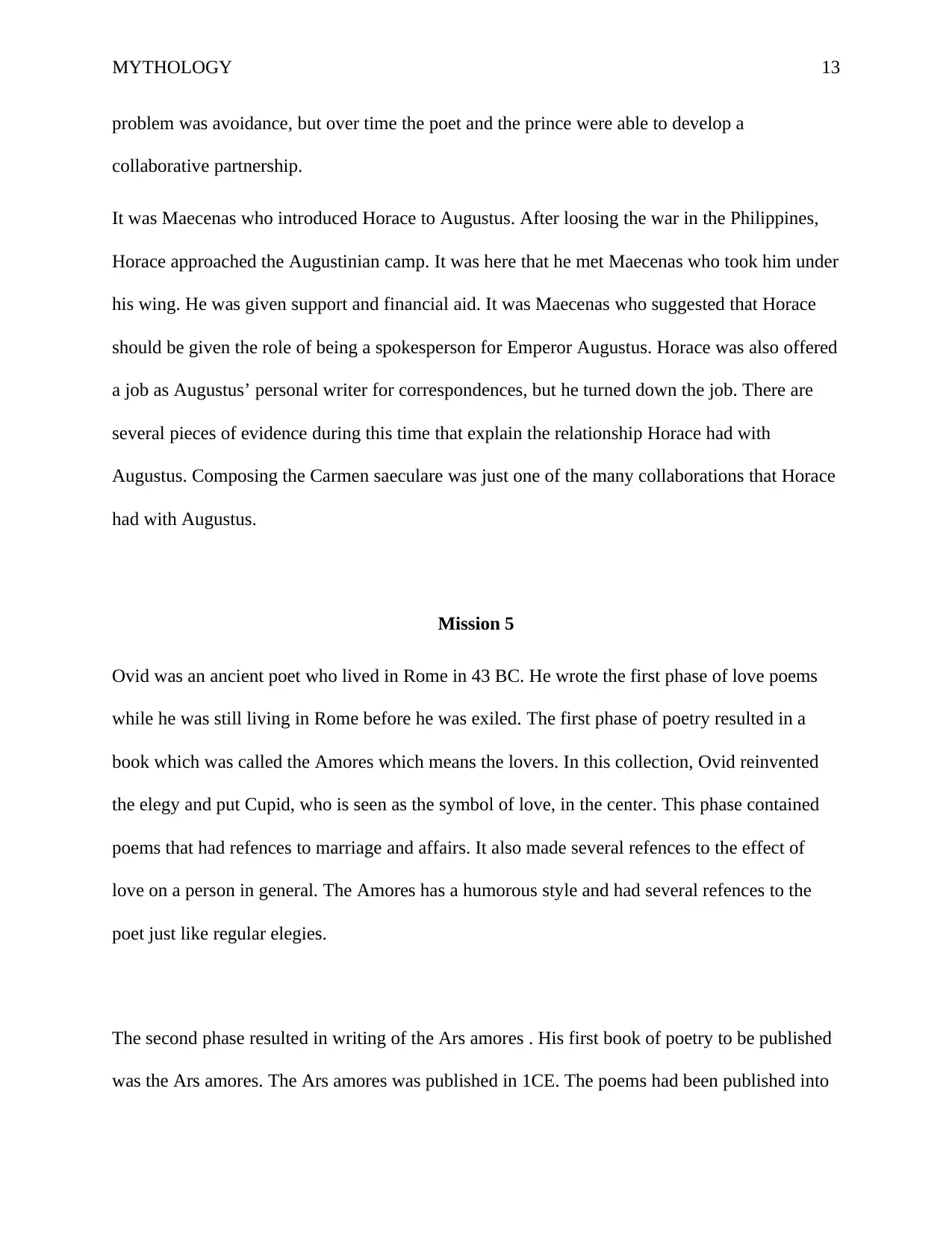
MYTHOLOGY 13
problem was avoidance, but over time the poet and the prince were able to develop a
collaborative partnership.
It was Maecenas who introduced Horace to Augustus. After loosing the war in the Philippines,
Horace approached the Augustinian camp. It was here that he met Maecenas who took him under
his wing. He was given support and financial aid. It was Maecenas who suggested that Horace
should be given the role of being a spokesperson for Emperor Augustus. Horace was also offered
a job as Augustus’ personal writer for correspondences, but he turned down the job. There are
several pieces of evidence during this time that explain the relationship Horace had with
Augustus. Composing the Carmen saeculare was just one of the many collaborations that Horace
had with Augustus.
Mission 5
Ovid was an ancient poet who lived in Rome in 43 BC. He wrote the first phase of love poems
while he was still living in Rome before he was exiled. The first phase of poetry resulted in a
book which was called the Amores which means the lovers. In this collection, Ovid reinvented
the elegy and put Cupid, who is seen as the symbol of love, in the center. This phase contained
poems that had refences to marriage and affairs. It also made several refences to the effect of
love on a person in general. The Amores has a humorous style and had several refences to the
poet just like regular elegies.
The second phase resulted in writing of the Ars amores . His first book of poetry to be published
was the Ars amores. The Ars amores was published in 1CE. The poems had been published into
problem was avoidance, but over time the poet and the prince were able to develop a
collaborative partnership.
It was Maecenas who introduced Horace to Augustus. After loosing the war in the Philippines,
Horace approached the Augustinian camp. It was here that he met Maecenas who took him under
his wing. He was given support and financial aid. It was Maecenas who suggested that Horace
should be given the role of being a spokesperson for Emperor Augustus. Horace was also offered
a job as Augustus’ personal writer for correspondences, but he turned down the job. There are
several pieces of evidence during this time that explain the relationship Horace had with
Augustus. Composing the Carmen saeculare was just one of the many collaborations that Horace
had with Augustus.
Mission 5
Ovid was an ancient poet who lived in Rome in 43 BC. He wrote the first phase of love poems
while he was still living in Rome before he was exiled. The first phase of poetry resulted in a
book which was called the Amores which means the lovers. In this collection, Ovid reinvented
the elegy and put Cupid, who is seen as the symbol of love, in the center. This phase contained
poems that had refences to marriage and affairs. It also made several refences to the effect of
love on a person in general. The Amores has a humorous style and had several refences to the
poet just like regular elegies.
The second phase resulted in writing of the Ars amores . His first book of poetry to be published
was the Ars amores. The Ars amores was published in 1CE. The poems had been published into
Secure Best Marks with AI Grader
Need help grading? Try our AI Grader for instant feedback on your assignments.
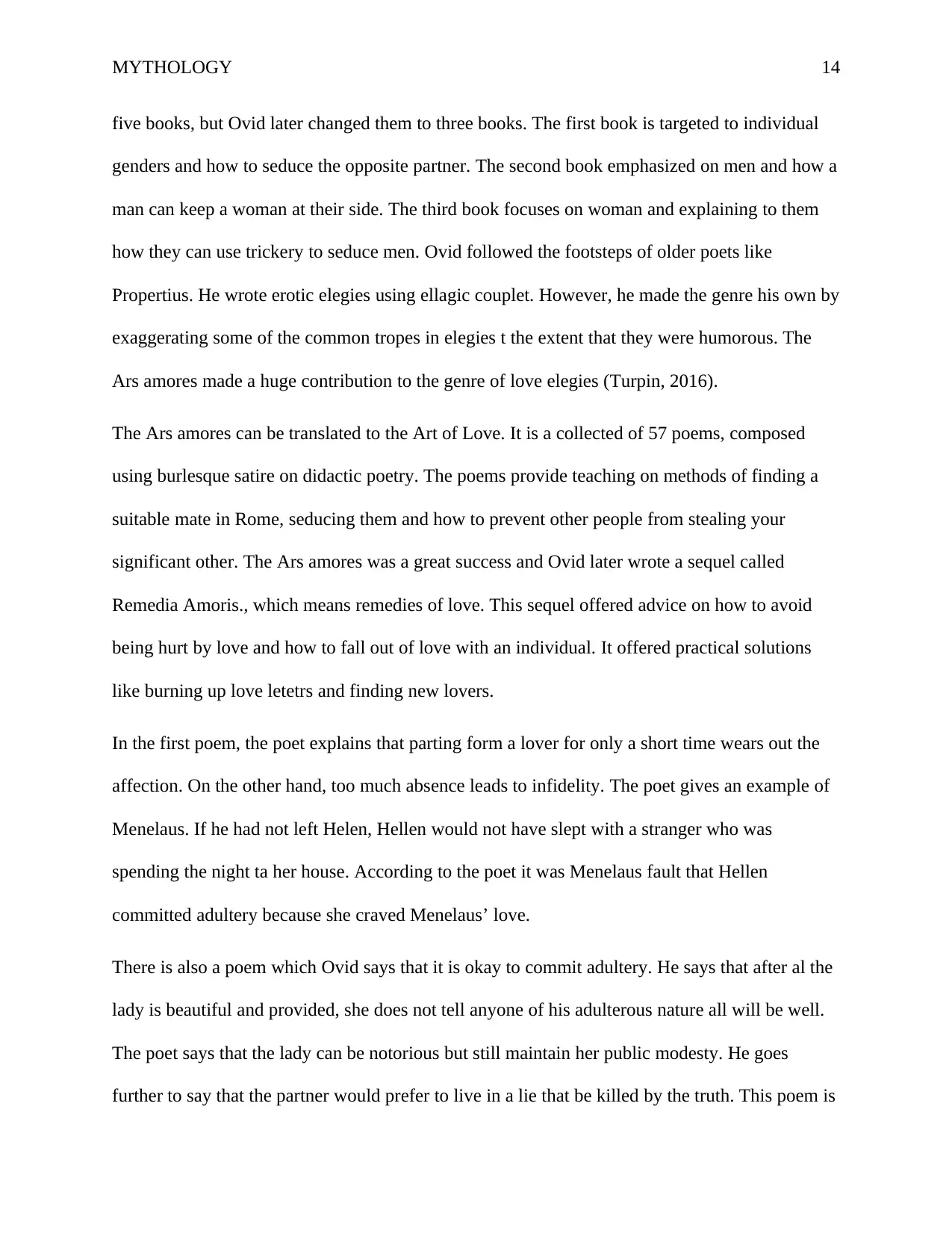
MYTHOLOGY 14
five books, but Ovid later changed them to three books. The first book is targeted to individual
genders and how to seduce the opposite partner. The second book emphasized on men and how a
man can keep a woman at their side. The third book focuses on woman and explaining to them
how they can use trickery to seduce men. Ovid followed the footsteps of older poets like
Propertius. He wrote erotic elegies using ellagic couplet. However, he made the genre his own by
exaggerating some of the common tropes in elegies t the extent that they were humorous. The
Ars amores made a huge contribution to the genre of love elegies (Turpin, 2016).
The Ars amores can be translated to the Art of Love. It is a collected of 57 poems, composed
using burlesque satire on didactic poetry. The poems provide teaching on methods of finding a
suitable mate in Rome, seducing them and how to prevent other people from stealing your
significant other. The Ars amores was a great success and Ovid later wrote a sequel called
Remedia Amoris., which means remedies of love. This sequel offered advice on how to avoid
being hurt by love and how to fall out of love with an individual. It offered practical solutions
like burning up love letetrs and finding new lovers.
In the first poem, the poet explains that parting form a lover for only a short time wears out the
affection. On the other hand, too much absence leads to infidelity. The poet gives an example of
Menelaus. If he had not left Helen, Hellen would not have slept with a stranger who was
spending the night ta her house. According to the poet it was Menelaus fault that Hellen
committed adultery because she craved Menelaus’ love.
There is also a poem which Ovid says that it is okay to commit adultery. He says that after al the
lady is beautiful and provided, she does not tell anyone of his adulterous nature all will be well.
The poet says that the lady can be notorious but still maintain her public modesty. He goes
further to say that the partner would prefer to live in a lie that be killed by the truth. This poem is
five books, but Ovid later changed them to three books. The first book is targeted to individual
genders and how to seduce the opposite partner. The second book emphasized on men and how a
man can keep a woman at their side. The third book focuses on woman and explaining to them
how they can use trickery to seduce men. Ovid followed the footsteps of older poets like
Propertius. He wrote erotic elegies using ellagic couplet. However, he made the genre his own by
exaggerating some of the common tropes in elegies t the extent that they were humorous. The
Ars amores made a huge contribution to the genre of love elegies (Turpin, 2016).
The Ars amores can be translated to the Art of Love. It is a collected of 57 poems, composed
using burlesque satire on didactic poetry. The poems provide teaching on methods of finding a
suitable mate in Rome, seducing them and how to prevent other people from stealing your
significant other. The Ars amores was a great success and Ovid later wrote a sequel called
Remedia Amoris., which means remedies of love. This sequel offered advice on how to avoid
being hurt by love and how to fall out of love with an individual. It offered practical solutions
like burning up love letetrs and finding new lovers.
In the first poem, the poet explains that parting form a lover for only a short time wears out the
affection. On the other hand, too much absence leads to infidelity. The poet gives an example of
Menelaus. If he had not left Helen, Hellen would not have slept with a stranger who was
spending the night ta her house. According to the poet it was Menelaus fault that Hellen
committed adultery because she craved Menelaus’ love.
There is also a poem which Ovid says that it is okay to commit adultery. He says that after al the
lady is beautiful and provided, she does not tell anyone of his adulterous nature all will be well.
The poet says that the lady can be notorious but still maintain her public modesty. He goes
further to say that the partner would prefer to live in a lie that be killed by the truth. This poem is
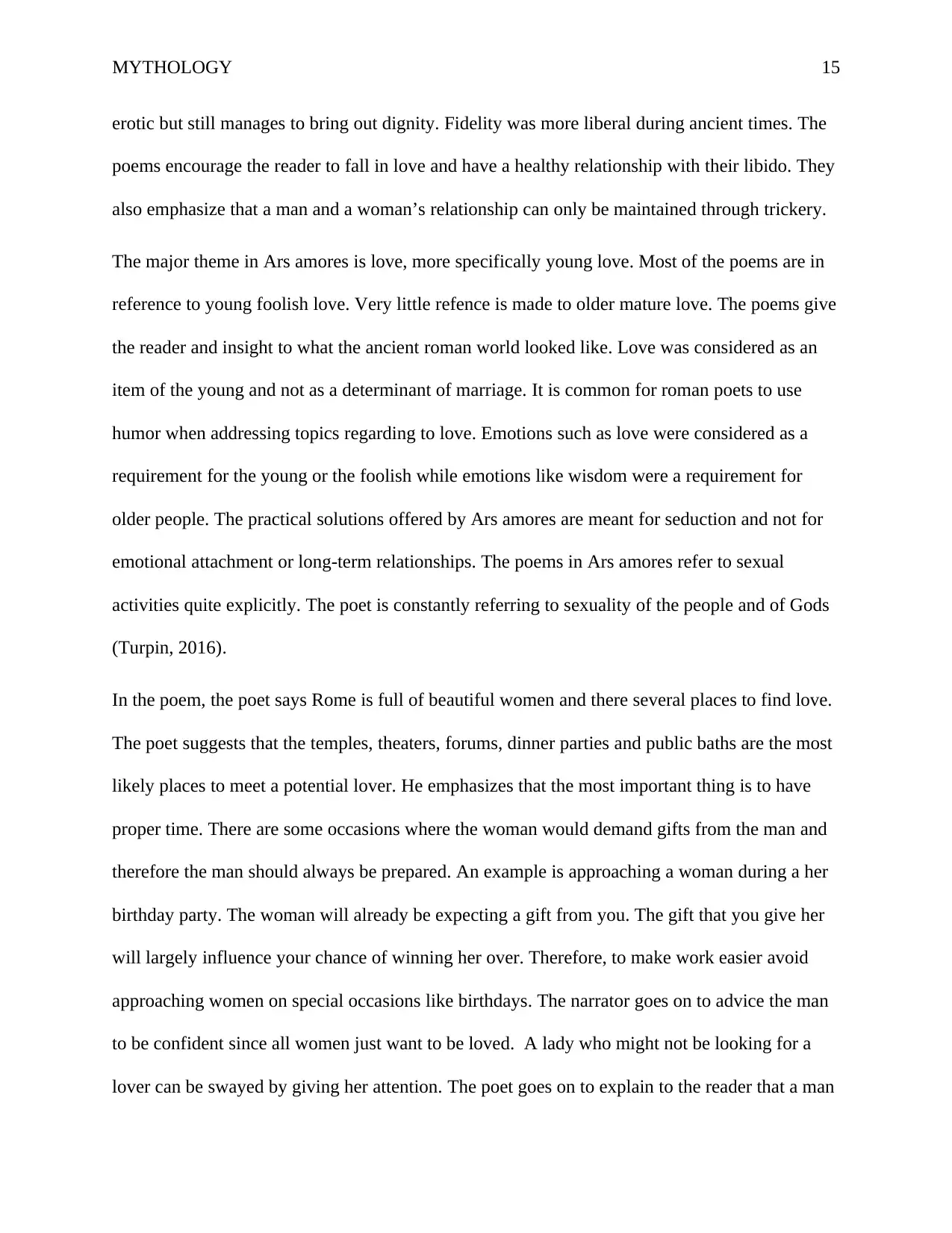
MYTHOLOGY 15
erotic but still manages to bring out dignity. Fidelity was more liberal during ancient times. The
poems encourage the reader to fall in love and have a healthy relationship with their libido. They
also emphasize that a man and a woman’s relationship can only be maintained through trickery.
The major theme in Ars amores is love, more specifically young love. Most of the poems are in
reference to young foolish love. Very little refence is made to older mature love. The poems give
the reader and insight to what the ancient roman world looked like. Love was considered as an
item of the young and not as a determinant of marriage. It is common for roman poets to use
humor when addressing topics regarding to love. Emotions such as love were considered as a
requirement for the young or the foolish while emotions like wisdom were a requirement for
older people. The practical solutions offered by Ars amores are meant for seduction and not for
emotional attachment or long-term relationships. The poems in Ars amores refer to sexual
activities quite explicitly. The poet is constantly referring to sexuality of the people and of Gods
(Turpin, 2016).
In the poem, the poet says Rome is full of beautiful women and there several places to find love.
The poet suggests that the temples, theaters, forums, dinner parties and public baths are the most
likely places to meet a potential lover. He emphasizes that the most important thing is to have
proper time. There are some occasions where the woman would demand gifts from the man and
therefore the man should always be prepared. An example is approaching a woman during a her
birthday party. The woman will already be expecting a gift from you. The gift that you give her
will largely influence your chance of winning her over. Therefore, to make work easier avoid
approaching women on special occasions like birthdays. The narrator goes on to advice the man
to be confident since all women just want to be loved. A lady who might not be looking for a
lover can be swayed by giving her attention. The poet goes on to explain to the reader that a man
erotic but still manages to bring out dignity. Fidelity was more liberal during ancient times. The
poems encourage the reader to fall in love and have a healthy relationship with their libido. They
also emphasize that a man and a woman’s relationship can only be maintained through trickery.
The major theme in Ars amores is love, more specifically young love. Most of the poems are in
reference to young foolish love. Very little refence is made to older mature love. The poems give
the reader and insight to what the ancient roman world looked like. Love was considered as an
item of the young and not as a determinant of marriage. It is common for roman poets to use
humor when addressing topics regarding to love. Emotions such as love were considered as a
requirement for the young or the foolish while emotions like wisdom were a requirement for
older people. The practical solutions offered by Ars amores are meant for seduction and not for
emotional attachment or long-term relationships. The poems in Ars amores refer to sexual
activities quite explicitly. The poet is constantly referring to sexuality of the people and of Gods
(Turpin, 2016).
In the poem, the poet says Rome is full of beautiful women and there several places to find love.
The poet suggests that the temples, theaters, forums, dinner parties and public baths are the most
likely places to meet a potential lover. He emphasizes that the most important thing is to have
proper time. There are some occasions where the woman would demand gifts from the man and
therefore the man should always be prepared. An example is approaching a woman during a her
birthday party. The woman will already be expecting a gift from you. The gift that you give her
will largely influence your chance of winning her over. Therefore, to make work easier avoid
approaching women on special occasions like birthdays. The narrator goes on to advice the man
to be confident since all women just want to be loved. A lady who might not be looking for a
lover can be swayed by giving her attention. The poet goes on to explain to the reader that a man
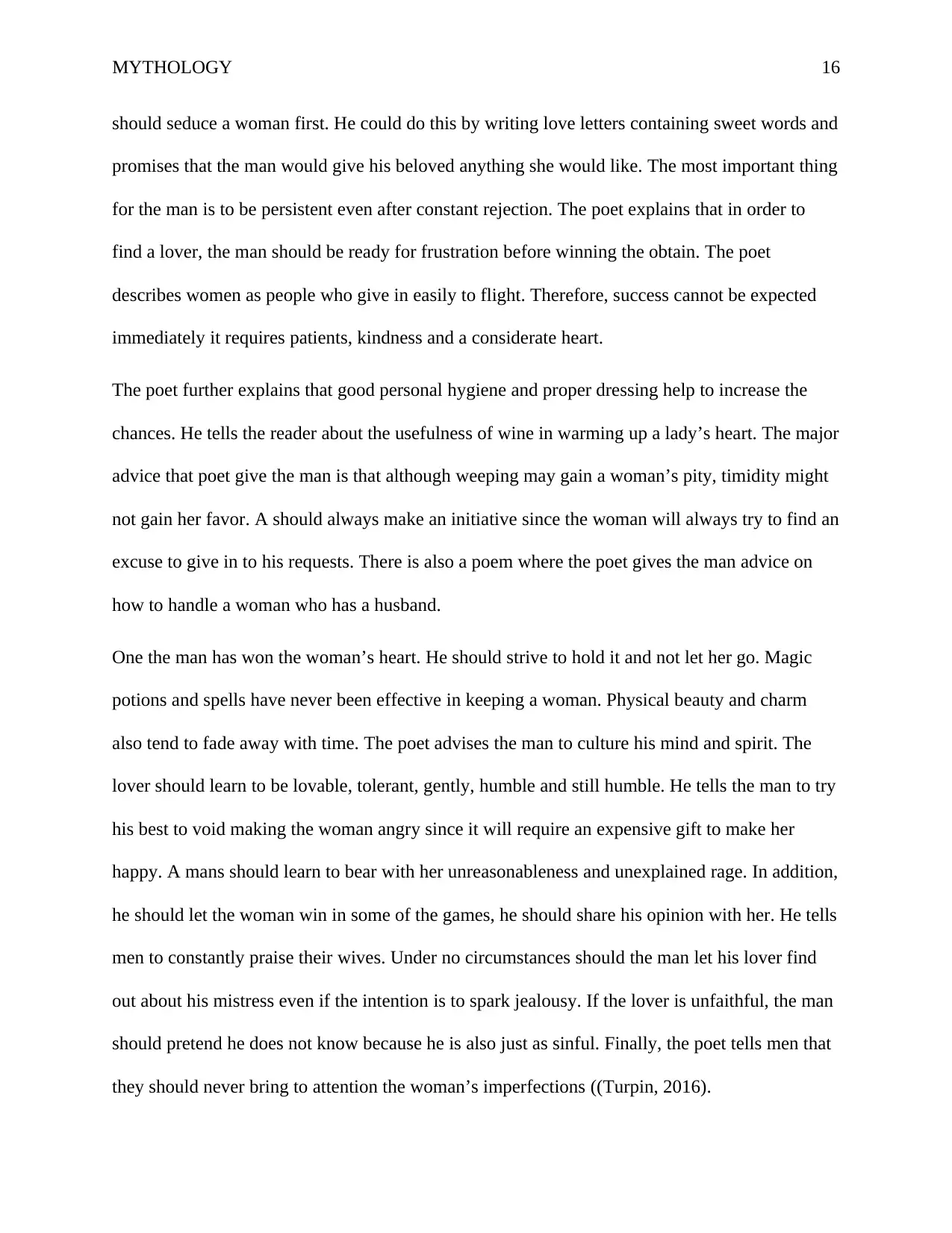
MYTHOLOGY 16
should seduce a woman first. He could do this by writing love letters containing sweet words and
promises that the man would give his beloved anything she would like. The most important thing
for the man is to be persistent even after constant rejection. The poet explains that in order to
find a lover, the man should be ready for frustration before winning the obtain. The poet
describes women as people who give in easily to flight. Therefore, success cannot be expected
immediately it requires patients, kindness and a considerate heart.
The poet further explains that good personal hygiene and proper dressing help to increase the
chances. He tells the reader about the usefulness of wine in warming up a lady’s heart. The major
advice that poet give the man is that although weeping may gain a woman’s pity, timidity might
not gain her favor. A should always make an initiative since the woman will always try to find an
excuse to give in to his requests. There is also a poem where the poet gives the man advice on
how to handle a woman who has a husband.
One the man has won the woman’s heart. He should strive to hold it and not let her go. Magic
potions and spells have never been effective in keeping a woman. Physical beauty and charm
also tend to fade away with time. The poet advises the man to culture his mind and spirit. The
lover should learn to be lovable, tolerant, gently, humble and still humble. He tells the man to try
his best to void making the woman angry since it will require an expensive gift to make her
happy. A mans should learn to bear with her unreasonableness and unexplained rage. In addition,
he should let the woman win in some of the games, he should share his opinion with her. He tells
men to constantly praise their wives. Under no circumstances should the man let his lover find
out about his mistress even if the intention is to spark jealousy. If the lover is unfaithful, the man
should pretend he does not know because he is also just as sinful. Finally, the poet tells men that
they should never bring to attention the woman’s imperfections ((Turpin, 2016).
should seduce a woman first. He could do this by writing love letters containing sweet words and
promises that the man would give his beloved anything she would like. The most important thing
for the man is to be persistent even after constant rejection. The poet explains that in order to
find a lover, the man should be ready for frustration before winning the obtain. The poet
describes women as people who give in easily to flight. Therefore, success cannot be expected
immediately it requires patients, kindness and a considerate heart.
The poet further explains that good personal hygiene and proper dressing help to increase the
chances. He tells the reader about the usefulness of wine in warming up a lady’s heart. The major
advice that poet give the man is that although weeping may gain a woman’s pity, timidity might
not gain her favor. A should always make an initiative since the woman will always try to find an
excuse to give in to his requests. There is also a poem where the poet gives the man advice on
how to handle a woman who has a husband.
One the man has won the woman’s heart. He should strive to hold it and not let her go. Magic
potions and spells have never been effective in keeping a woman. Physical beauty and charm
also tend to fade away with time. The poet advises the man to culture his mind and spirit. The
lover should learn to be lovable, tolerant, gently, humble and still humble. He tells the man to try
his best to void making the woman angry since it will require an expensive gift to make her
happy. A mans should learn to bear with her unreasonableness and unexplained rage. In addition,
he should let the woman win in some of the games, he should share his opinion with her. He tells
men to constantly praise their wives. Under no circumstances should the man let his lover find
out about his mistress even if the intention is to spark jealousy. If the lover is unfaithful, the man
should pretend he does not know because he is also just as sinful. Finally, the poet tells men that
they should never bring to attention the woman’s imperfections ((Turpin, 2016).
Paraphrase This Document
Need a fresh take? Get an instant paraphrase of this document with our AI Paraphraser
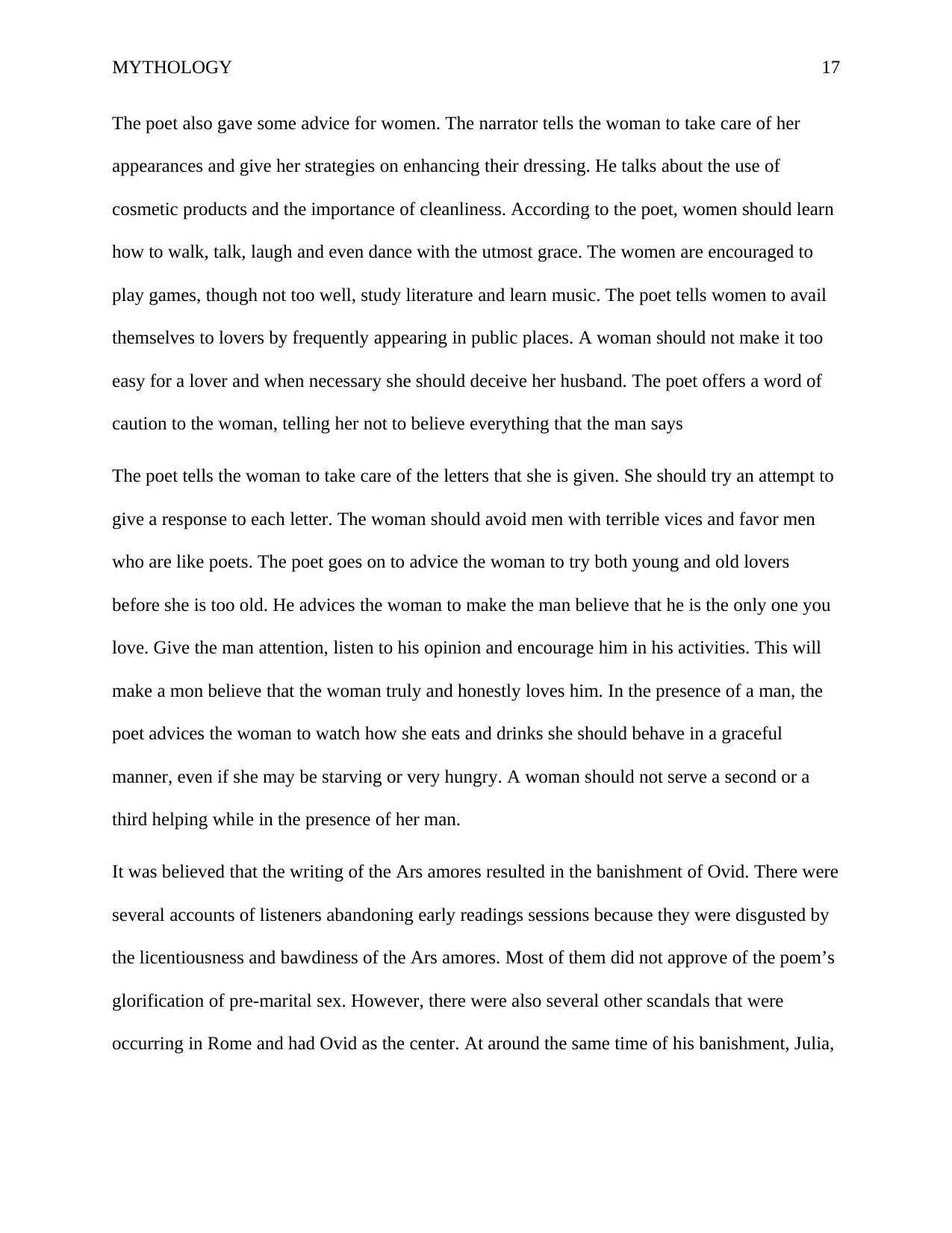
MYTHOLOGY 17
The poet also gave some advice for women. The narrator tells the woman to take care of her
appearances and give her strategies on enhancing their dressing. He talks about the use of
cosmetic products and the importance of cleanliness. According to the poet, women should learn
how to walk, talk, laugh and even dance with the utmost grace. The women are encouraged to
play games, though not too well, study literature and learn music. The poet tells women to avail
themselves to lovers by frequently appearing in public places. A woman should not make it too
easy for a lover and when necessary she should deceive her husband. The poet offers a word of
caution to the woman, telling her not to believe everything that the man says
The poet tells the woman to take care of the letters that she is given. She should try an attempt to
give a response to each letter. The woman should avoid men with terrible vices and favor men
who are like poets. The poet goes on to advice the woman to try both young and old lovers
before she is too old. He advices the woman to make the man believe that he is the only one you
love. Give the man attention, listen to his opinion and encourage him in his activities. This will
make a mon believe that the woman truly and honestly loves him. In the presence of a man, the
poet advices the woman to watch how she eats and drinks she should behave in a graceful
manner, even if she may be starving or very hungry. A woman should not serve a second or a
third helping while in the presence of her man.
It was believed that the writing of the Ars amores resulted in the banishment of Ovid. There were
several accounts of listeners abandoning early readings sessions because they were disgusted by
the licentiousness and bawdiness of the Ars amores. Most of them did not approve of the poem’s
glorification of pre-marital sex. However, there were also several other scandals that were
occurring in Rome and had Ovid as the center. At around the same time of his banishment, Julia,
The poet also gave some advice for women. The narrator tells the woman to take care of her
appearances and give her strategies on enhancing their dressing. He talks about the use of
cosmetic products and the importance of cleanliness. According to the poet, women should learn
how to walk, talk, laugh and even dance with the utmost grace. The women are encouraged to
play games, though not too well, study literature and learn music. The poet tells women to avail
themselves to lovers by frequently appearing in public places. A woman should not make it too
easy for a lover and when necessary she should deceive her husband. The poet offers a word of
caution to the woman, telling her not to believe everything that the man says
The poet tells the woman to take care of the letters that she is given. She should try an attempt to
give a response to each letter. The woman should avoid men with terrible vices and favor men
who are like poets. The poet goes on to advice the woman to try both young and old lovers
before she is too old. He advices the woman to make the man believe that he is the only one you
love. Give the man attention, listen to his opinion and encourage him in his activities. This will
make a mon believe that the woman truly and honestly loves him. In the presence of a man, the
poet advices the woman to watch how she eats and drinks she should behave in a graceful
manner, even if she may be starving or very hungry. A woman should not serve a second or a
third helping while in the presence of her man.
It was believed that the writing of the Ars amores resulted in the banishment of Ovid. There were
several accounts of listeners abandoning early readings sessions because they were disgusted by
the licentiousness and bawdiness of the Ars amores. Most of them did not approve of the poem’s
glorification of pre-marital sex. However, there were also several other scandals that were
occurring in Rome and had Ovid as the center. At around the same time of his banishment, Julia,
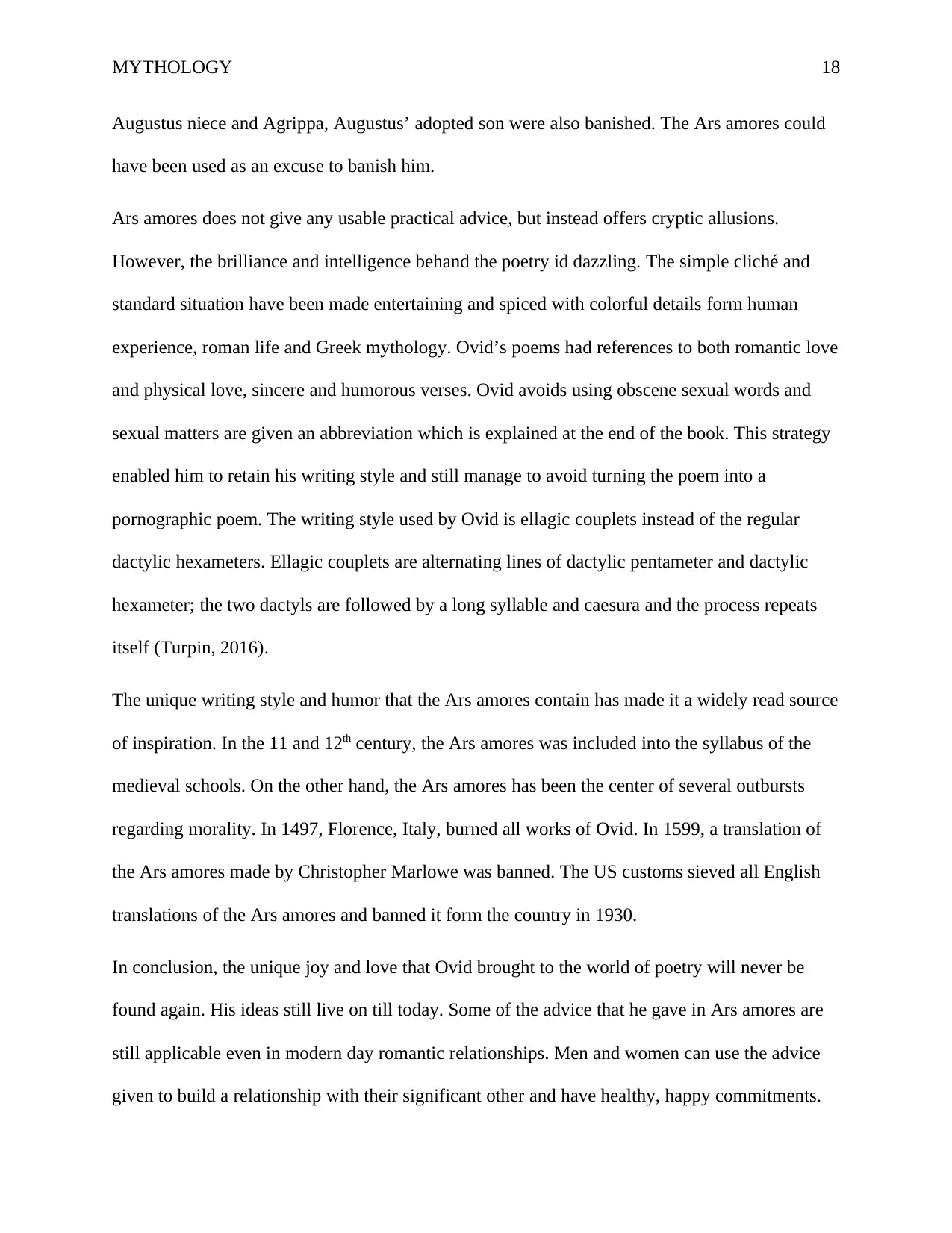
MYTHOLOGY 18
Augustus niece and Agrippa, Augustus’ adopted son were also banished. The Ars amores could
have been used as an excuse to banish him.
Ars amores does not give any usable practical advice, but instead offers cryptic allusions.
However, the brilliance and intelligence behand the poetry id dazzling. The simple cliché and
standard situation have been made entertaining and spiced with colorful details form human
experience, roman life and Greek mythology. Ovid’s poems had references to both romantic love
and physical love, sincere and humorous verses. Ovid avoids using obscene sexual words and
sexual matters are given an abbreviation which is explained at the end of the book. This strategy
enabled him to retain his writing style and still manage to avoid turning the poem into a
pornographic poem. The writing style used by Ovid is ellagic couplets instead of the regular
dactylic hexameters. Ellagic couplets are alternating lines of dactylic pentameter and dactylic
hexameter; the two dactyls are followed by a long syllable and caesura and the process repeats
itself (Turpin, 2016).
The unique writing style and humor that the Ars amores contain has made it a widely read source
of inspiration. In the 11 and 12th century, the Ars amores was included into the syllabus of the
medieval schools. On the other hand, the Ars amores has been the center of several outbursts
regarding morality. In 1497, Florence, Italy, burned all works of Ovid. In 1599, a translation of
the Ars amores made by Christopher Marlowe was banned. The US customs sieved all English
translations of the Ars amores and banned it form the country in 1930.
In conclusion, the unique joy and love that Ovid brought to the world of poetry will never be
found again. His ideas still live on till today. Some of the advice that he gave in Ars amores are
still applicable even in modern day romantic relationships. Men and women can use the advice
given to build a relationship with their significant other and have healthy, happy commitments.
Augustus niece and Agrippa, Augustus’ adopted son were also banished. The Ars amores could
have been used as an excuse to banish him.
Ars amores does not give any usable practical advice, but instead offers cryptic allusions.
However, the brilliance and intelligence behand the poetry id dazzling. The simple cliché and
standard situation have been made entertaining and spiced with colorful details form human
experience, roman life and Greek mythology. Ovid’s poems had references to both romantic love
and physical love, sincere and humorous verses. Ovid avoids using obscene sexual words and
sexual matters are given an abbreviation which is explained at the end of the book. This strategy
enabled him to retain his writing style and still manage to avoid turning the poem into a
pornographic poem. The writing style used by Ovid is ellagic couplets instead of the regular
dactylic hexameters. Ellagic couplets are alternating lines of dactylic pentameter and dactylic
hexameter; the two dactyls are followed by a long syllable and caesura and the process repeats
itself (Turpin, 2016).
The unique writing style and humor that the Ars amores contain has made it a widely read source
of inspiration. In the 11 and 12th century, the Ars amores was included into the syllabus of the
medieval schools. On the other hand, the Ars amores has been the center of several outbursts
regarding morality. In 1497, Florence, Italy, burned all works of Ovid. In 1599, a translation of
the Ars amores made by Christopher Marlowe was banned. The US customs sieved all English
translations of the Ars amores and banned it form the country in 1930.
In conclusion, the unique joy and love that Ovid brought to the world of poetry will never be
found again. His ideas still live on till today. Some of the advice that he gave in Ars amores are
still applicable even in modern day romantic relationships. Men and women can use the advice
given to build a relationship with their significant other and have healthy, happy commitments.

MYTHOLOGY 19
Although he spent a lot of time in exile, Ovid died a happy man. He had become famous for a
short duration, but he still managed to make an impact in the world
Although he spent a lot of time in exile, Ovid died a happy man. He had become famous for a
short duration, but he still managed to make an impact in the world
Secure Best Marks with AI Grader
Need help grading? Try our AI Grader for instant feedback on your assignments.
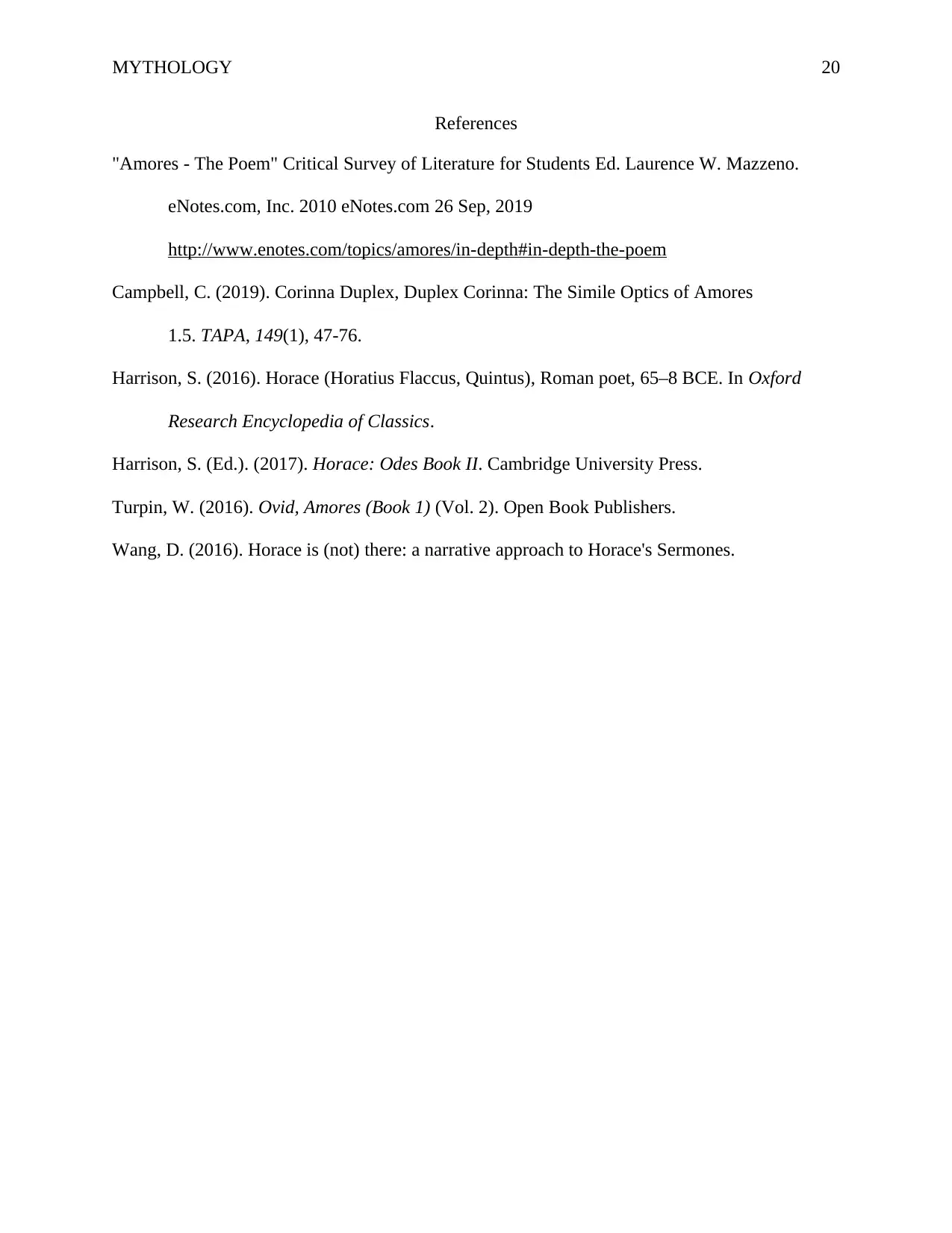
MYTHOLOGY 20
References
"Amores - The Poem" Critical Survey of Literature for Students Ed. Laurence W. Mazzeno.
eNotes.com, Inc. 2010 eNotes.com 26 Sep, 2019
http://www.enotes.com/topics/amores/in-depth#in-depth-the-poem
Campbell, C. (2019). Corinna Duplex, Duplex Corinna: The Simile Optics of Amores
1.5. TAPA, 149(1), 47-76.
Harrison, S. (2016). Horace (Horatius Flaccus, Quintus), Roman poet, 65–8 BCE. In Oxford
Research Encyclopedia of Classics.
Harrison, S. (Ed.). (2017). Horace: Odes Book II. Cambridge University Press.
Turpin, W. (2016). Ovid, Amores (Book 1) (Vol. 2). Open Book Publishers.
Wang, D. (2016). Horace is (not) there: a narrative approach to Horace's Sermones.
References
"Amores - The Poem" Critical Survey of Literature for Students Ed. Laurence W. Mazzeno.
eNotes.com, Inc. 2010 eNotes.com 26 Sep, 2019
http://www.enotes.com/topics/amores/in-depth#in-depth-the-poem
Campbell, C. (2019). Corinna Duplex, Duplex Corinna: The Simile Optics of Amores
1.5. TAPA, 149(1), 47-76.
Harrison, S. (2016). Horace (Horatius Flaccus, Quintus), Roman poet, 65–8 BCE. In Oxford
Research Encyclopedia of Classics.
Harrison, S. (Ed.). (2017). Horace: Odes Book II. Cambridge University Press.
Turpin, W. (2016). Ovid, Amores (Book 1) (Vol. 2). Open Book Publishers.
Wang, D. (2016). Horace is (not) there: a narrative approach to Horace's Sermones.
1 out of 20
![[object Object]](/_next/static/media/star-bottom.7253800d.svg)
